
- Sodha Travel on Facebook
- Sodha Travel on Instagram
- Sodha Travel on YouTube
- Sign up for Updates From Sodha Travel
- USA +1 877 564 7526
- AUS +61 4 6699 2806
- Why Sodha Travel
- Philanthropy
- Destinations
- Signature Stays
- About India
- About Sri Lanka
- About Bhutan
- About Thailand
- About Vietnam
- About Nepal
- About Cambodia
- Family Tours
- Safe Travels
- Travel Blog
- Go! Girl Guides India
- Destination Guides
- Travel Insurance
- Get in Touch
- Design Your Trip
- Reservations

Sodha Travel Blog
Let's talk travel, blog categories.
- Featured Tours
- Accommodations
- Testimonials
- Transportation
- Food and Water
- Festivals and Holidays
- Communication
- North India
- Travel Tips
- Popular Indian Foods
- Weather and Climate
- Delhi Shopping Market
- Group Tours
- Royal Lifestyle
- South India
- Wildlife of India
- Architecture
- Ayurveda Retreats
- Best Travel Destination
- Bhutan Tourist Attractions
- Cambodia Travel
- Early Morning Breakfast in Delhi
- Food in Nepal
- Golden Temple's Langar Hall
- Golden Triangle
- Haveli Dharampura
- Hiking Specialist
- Home-stay in Bangalore
- Indian Rituals
- Life of Sherpas
- Phuket Tours
- Places to see in Nepal
- Private tours in India
- Seven Wonder of Thailand
- Talabgaon Castle in Rajasthan
- Thailand Travel Updates
- Tigers in Thailand
- Tips for Traveling To India.
- Tourist Train in India
- Tours to Oregon
- Train Travel
- Travel Company
- Travel Consultant
- Travel bucket list
- Travel to Vietnam
- Travel trivia
- Traveler Reviews
- Traveling with children to South Asia
- UAE Tour Packages
- UDAN Scheme
- Veddas in Sri Lanka
- Vietnam Travel Guide
- Windermere River House
- Women only tour
- best treks in Nepal
- dabbawalas of mumbai
- daily sherpa life
- eVisa Policy Updates
- sherpas in nepal
- sherpas of nepal
- spiritual places
- tiffin services
- travel destinations
Know the difference between Travel Consultants and Travel Agents

What is the difference between a travel agent and a travel consultant? The shift started in the 1990's with the introduction of online booking sites. Travelers who once reserved air tickets and hotels directly with a travel agent now had access to book directly. In the following 25+ years, thousands of agencies closed their doors and the business models shifted from distributors to specialists.

Travel agents are often affiliated with an agency or consortia and serve as an intermediary between booking systems and travelers. They may have a speciality for a destination, region, or niche like African safaris or Caribbean cruises. Agents also receive incentives from the companies and organizations they promote. For example, if they book a certain number of rooms with Marriott Hotels & Resorts, they accrue bonuses and/or complimentary stays for personal use.
Travel consultants have emerged to serve the need of those seeking experiential travel. While online sites now dominate the market for air ticket + hotel bundles, consultants offer a personal touch. They are advocates who create a conversation, map logistics, and offer authentic experiences for their clients. Consultants often work directly with Destination Management Companies (DMC's) abroad in the respective countries.

So who is the ideal resource for your trip?
If you are seeking a good deal on basic services, including flight ticketing and hotel rooms, an agent may have volume from their host company to offer discounted rates. However, if a good value to you includes assistance and advocacy on specialized experiences, a travel consultant will have access to more local connections - farmhouse cuisine with villagers, tea with a royal family, or private viewings of art collections.
At Sodha Travel, we consider our team travel consultants. We are certified destination specialists, independently owned, and only reserve comprehensive itineraries. Additionally, we are not associated with a commission or loyalty program and can therefore offer unbiased suggestions for accommodations and experiences. Our philosophy is to create relationships with our clients and offer truly customized travel programs. We have spent thousands of hours staying in hotels, meeting guides, inspecting vehicles, and building relationships with vendors, proprietors, and locals. Sodha Travel has a mindful, integral approach to tourism with a commitment to socially and environmentally conscious itineraries. This expertise and awareness comes from years of servicing South Asia.
Let us know how we can assist with planning your adventure in South Asia!
Topics: Accommodations , Transportation , Education , consultant
Written by Allison Sodha
As the President of Sodha Travel and author of Go! Girl Guides India, Allison has spent almost two decades exploring South Asia. She has a passion for creating experiences fueled by a deeper understanding of local communities.
Recent Posts
Sodha travel.
- U.S. +1 877 564 7526 or
- A.U.S. +61 4 6699 2806 or
FAX: 480.772.4696
Terms and Conditions Copyright © Sodha Travel, 2019. All Rights Reserved.
Sign up for news, updates, and special offers!
Explore Jobs
- Jobs Near Me
- Remote Jobs
- Full Time Jobs
- Part Time Jobs
- Entry Level Jobs
- Work From Home Jobs
Find Specific Jobs
- $15 Per Hour Jobs
- $20 Per Hour Jobs
- Hiring Immediately Jobs
- High School Jobs
- H1b Visa Jobs
Explore Careers
- Business And Financial
- Architecture And Engineering
- Computer And Mathematical
Explore Professions
- What They Do
- Certifications
- Demographics
Best Companies
- Health Care
- Fortune 500
Explore Companies
- CEO And Executies
- Resume Builder
- Career Advice
- Explore Majors
- Questions And Answers
- Interview Questions
Travel Agent Vs Travel Consultant
The differences between travel agents and travel consultants can be seen in a few details. Each job has different responsibilities and duties. It typically takes 1-2 years to become both a travel agent and a travel consultant. Additionally, a travel consultant has an average salary of $46,705, which is higher than the $33,128 average annual salary of a travel agent.
The top three skills for a travel agent include reservations, booking and AAA. The most important skills for a travel consultant are reservations, booking, and car rentals.
Travel agent vs travel consultant overview
What does a travel agent do.
Travel agents help plan, choose, and organize travel schedules. Generally, they ensure that clients can efficiently process their travel plans and get the best travel experience possible. Primarily, they assist individuals, groups, and business travelers in booking their flights and hotel accommodations, buying tickets to events, and arranging their transport from one place to the other. They also provide recommendations for itineraries and offer travel packages from different airlines, hotels, or cruise lines. Travel agents can work as freelancers or mostly be employed by travel agencies.
What does a travel consultant do?
A travel consultant is responsible for organizing travel arrangements by recommending travel packages, inclusive of all details such as location, travel costs, amenities, and other related factors. Travel consultants confirm the client's preference, ensuring the execution of plans based on their best interests. They arrange the itineraries, reservations, and other specifics for the client's security and comfortability. Travel consultants should also consider factors that may affect travel plans, such as weather conditions and other booking complications, immediately notifying the client on plan adjustments.
Travel agent vs travel consultant salary
Travel agents and travel consultants have different pay scales, as shown below.
Differences between travel agent and travel consultant education
There are a few differences between a travel agent and a travel consultant in terms of educational background:
Travel agent vs travel consultant demographics
Here are the differences between travel agents' and travel consultants' demographics:
Differences between travel agent and travel consultant duties and responsibilities
Travel agent example responsibilities..
- Manage corporate travel arrangements for business accounts, including passport and visa documents.
- Book hotel reservations; recommend and cross sell hotel rooms for availability within the Marriott brand of hotels and resorts.
- Service inbound calls using Sabre system by setting itineraries and booking new reservations, also including billing reversals or accommodations.
- Create PDFs prior to being send to print vendors and edit sell sheets for product introduction mailings.
- Assist all travelers with acquiring passport, passport renewals, and visa requirements on any international travel itineraries.
- Create scripts to help agents process long driven formats in Worldspan, Sabre, and Amadeus for quickness and accuracy.
Travel Consultant Example Responsibilities.
- Manage small scale projects to ensure profile databases and scripts properly transfer information in GDS.
- Negotiate contracts, book event/meeting space; manage corporate housing for independent contractors, including RFP's and ROI's.
- Collaborate with other offices on VIP and unusual international reservations for better quality of reservations.
- Provide customer service by providing administrative support to associates using the online reservation booking tool Apollo.
- Modify business travelers airline, car and hotel reservations including exchanging tickets in emergency and non emergency situations.
- Book transportation and hotel reservations using a computer or telephone, collecting payment for transportation and accommodations from the customer.
Travel agent vs travel consultant skills
- Reservations, 30%
- Booking, 12%
- Credit Card, 7%
- Travel Itineraries, 4%
- Reservation System, 3%
- Reservations, 33%
- Car Rentals, 6%
- Hotel Reservations, 4%
- Corporate Travel, 4%
- Travel Industry, 4%
Travel Agent vs. Similar Jobs
- Travel Agent vs Travel Consultant
- Travel Agent vs Real Estate Agent
- Travel Agent vs Tour Operator
- Travel Agent vs Information Technology Technician
- Travel Agent vs Insurance Agent
- Travel Agent vs Booker
- Travel Agent vs Certified Medical Technician
- Travel Agent vs Travel Coordinator
- Travel Agent vs Travel Counselor
- Travel Agent vs Agent
- Travel Agent vs Travel Manager
- Travel Agent vs Corporate Travel Agent
- Travel Agent vs Corporate Travel Consultant
- Travel Agent vs Senior Travel Consultant
- Travel Agent vs Corporate Travel Counselor
Travel Agent Related Careers
- Auto Travel Counselor
- Corporate Travel Agent
- Corporate Travel Consultant
- Corporate Travel Counselor
- Corporate Travel Expert
- Cruise Counselor
- Senior Travel Consultant
- Travel Consultant
- Travel Coordinator
- Travel Counselor
- Travel Manager
- Travel Service Consultant
- Travel Specialist
Travel Agent Related Jobs
- Agent Employment Near Me
- Auto Travel Counselor Employment Near Me
- Corporate Travel Agent Employment Near Me
- Corporate Travel Consultant Employment Near Me
- Corporate Travel Counselor Employment Near Me
- Corporate Travel Expert Employment Near Me
- Cruise Counselor Employment Near Me
- Senior Travel Consultant Employment Near Me
- Tour Agent Employment Near Me
- Travel Consultant Employment Near Me
- Travel Coordinator Employment Near Me
- Travel Counselor Employment Near Me
- Travel Manager Employment Near Me
- Travel Service Consultant Employment Near Me
- Travel Specialist Employment Near Me
What Similar Roles Do
- Agent Responsibilities
- Travel Consultant Responsibilities
- Travel Coordinator Responsibilities
- Travel Manager Responsibilities
- Travel Specialist Responsibilities
- Zippia Careers
- Sales Industry
- Travel Agent
Browse sales jobs
The magazine of Glion Institute of Higher Education
What is a travel consultant?

HOSPITALITY UNCOVERED
Similar Content
Are you passionate about seeing the world and sharing your enthusiasm with others? With the travel market expected to grow by $3,392.95 billion by 2027 , there’s never been a better time to become a travel consultant. But what exactly is a travel consultant and what do they do? In this article, we look at the responsibilities and skills of a travel consultant, how to become one and the potential salary you can command in this role.
What does a travel consultant do?
Hospitality professionals who organize travel plans for individuals, groups or businesses, travel consultants suggest ideal destinations for their clients, whether for a family vacation or a corporate trip. They also handle reservations and secure the best hotel, restaurant and activity deals. Travel consultants may work for an agency or operate independently but are not incentivized to book with specific hotels or airlines, unlike travel agents. They focus on making reservations with organizations that best meet their clients’ needs.
The key tasks of a travel consultant are:
- Meet clients to understand their preferences, budget and specific requirements for their trip
- Investigate destinations, accommodations, transportation options and activities to provide tailored recommendations
- Develop detailed travel plans, including flight schedules, accommodation, sightseeing and other activities
- Make reservations for flights, hotels, car rentals, tours and other services
- Provide information on necessary travel documents, such as passports and visas, and help with the application process
- Advise clients on suitable travel insurance options and assist with the purchase of policies
- Make sure destinations cater for specialist needs such as dietary requirements and accessibility
- Help clients maximize their budget by finding the best deals and discounts
- Keep clients informed about travel advisories, weather conditions and any changes to their plans
- Offer assistance and solutions during the trip, including rebooking services in case of cancellations or delays
- Gather feedback from clients after their trip to improve future services and ensure satisfaction
Travel consultant vs travel agent
Both require strong organizational skills, knowledge of destinations and handling logistics such as flights, accommodation and activities, but these professions differ in some ways. Below, we’ll discuss the main similarities and differences between a travel consultant and a travel agent.
Similarities
Travel consultants and agents share the following responsibilities:
- Advising clients on travel options and make reservations
- Staying informed about travel trends and regulations
- Customer service, ensuring clients have a pleasant experience
Differences
There are also important distinctions between the two, such as:
- Travel consultants provide more personalized services, focusing on creating tailored experiences based on individual client preferences and needs
- Travel agents handle more transactional tasks, such as booking flights, hotels and tours, often within established travel agencies
- Consultants may offer specialized advice and detailed planning, catering to specific types of travel such as luxury or corporate, while agents might deal with a broader range of general travel bookings
- Ultimately, while both roles aim to assist with travel planning, consultants generally offer a more customized approach compared to the broader services provided by agents
What are the benefits of being a travel consultant?
As with many hospitality positions, there are numerous professional and personal advantages in this role. It allows you to combine your passion for travel with a rewarding hospitality career , while also providing opportunities to build valuable skills and establish meaningful connections. Among the benefits of being a travel consultant are:
- Travel opportunities : gain first-hand experience by visiting various destinations
- Personal growth : develop skills in communication , problem solving and time management through daily interactions and tasks
- Flexibility : enjoy flexible working hours, with options for remote work or self employment
- Networking : build a broad range of contacts in the travel industry, including hoteliers, tour operators and airlines
- Job satisfaction : experience the joy of helping clients create memorable trips and receive positive feedback
- Financial incentives : earn commission and bonuses based on bookings and client satisfaction
- Variety : work with different types of clients and plan a broad range of trips, ensuring no two days are the same.
- Creativity : design unique travel experiences that cater to individual client preferences
- Professional development : attend industry conferences and training sessions to improve skills and knowledge continuously
- Perks : access travel discounts and special rates, making personal travel more affordable
How to become a travel consultant?
Launching a travel consulting career involves several steps that blend education, experience and networking. The main ones to consider are:
- Gain qualifications : many travel consultants have a bachelor’s degree in a hospitality-related field
- Get relevant experience : look for a degree program that offers hospitality internships that give you valuable experience
- Study another language : bilingual consultants are often viewed as more credible. Speaking another language facilitates communication with hotels and airlines in other countries. Even basic knowledge can be helpful
- Travel frequently : first-hand experience helps you make better recommendations for clients. Visiting as many new locations as possible and keeping a journal of the best restaurants, shops and activities
- Get a relevant job : experience in travel, customer service or hospitality is valuable for building industry connections and learning more about the field. Entry-level positions such as flight attendant, front desk clerk or customer service representative can help you develop communication and customer service skills, which are essential for a travel consultant
- Complete a travel certification program : gain qualifications through reputable organizations such as the International Association of Travel Agents Network (IATAN) or the American Society of Travel Advisors (ASTA). Certification demonstrates dedication to the profession and increases credibility
- Networking : join professional associations and attend industry events to make connections
- Choose an agency or start your own : starting at a travel agency can provide resources such as office space and a client base. Alternatively, you can become self employed by launching your own travel consultancy
Find your specialty : new consultants typically offer generalized services, but with experience, you can specialize. Options include student trips, luxury travel, business travel or focusing on a specific region

What skills do you need to be a travel consultant?
This role requires a blend of various attributes to ensure clients have a seamless and enjoyable guest experience . The following skills help consultants meet clients’ needs, manage logistics and provide expert guidance:
- Communication skills : clearly understand and meet clients’ needs while providing detailed information and recommendations
- Organizational skills : manage multiple bookings, itineraries and schedules efficiently
- Attention to detail : make sure all travel arrangements are accurate and nothing is overlooked
- Problem solving : address unexpected issues such as flight cancellations or changes in travel plans
- Geographical knowledge : make informed recommendations and provide insights about various locations
- Customer service : build and maintain client relationships, ensuring satisfaction and encouraging repeat business
- Sales skills : promote services and convince clients to book through the consultant, including upselling and cross-selling additional travel products
- Technological proficiency : use travel booking software and customer management systems efficiently
- Time management : handle multiple clients and tasks simultaneously without compromising on the quality of service
- Adaptability : stay updated with the latest travel trends and industry changes to offer the most current and relevant advice to clients
All of these skills are essential for a career as a travel consultant and you can improve them while gaining valuable experience with the right degree program.
Build the skills needed as a travel consultant
Master the tools of the trade to help you succeed in tourism and travel management thanks to our expert tutors and incredible industry placements

How much do travel consultants earn?
The average annual salary of hospitality professionals in this role is $67,360, but it can rise to $76,004 based on education and experience. Travel consultants with extensive client networks can potentially earn even higher incomes. As well as base salary, tips and commissions often contribute to overall earnings, making this career financially rewarding for dedicated and skilled consultants.
How can a hospitality school prepare you for a career as a travel consultant?
The right degree program from the right institution can equip you with the necessary skills and knowledge for a successful travel consultancy career. Look for a course that covers various aspects of hospitality, including customer service, travel and tourism management, luxury hospitality and travel and hospitality business administration. These courses help you understand the operational and managerial aspects of the travel industry.
Hospitality schools also emphasize practical learning through hospitality internships and hands-on projects. These experiences allow you to apply classroom knowledge to real-world situations, develop problem-solving abilities and gain industry insights. Working in actual hospitality settings allows you to build a network of professional contacts, which is invaluable for future career opportunities.
You’ll also benefit from specialized courses in travel and tourism, which will give you a deeper understanding of destinations, travel planning and client relationship management. Learning from experienced faculty and industry professionals gives you an in-depth business perspective on current trends and best practices.
Career progression opportunities
From entry-level positions, travel consultants can progress to roles with greater responsibilities and rewards. They could become a travel manager, destination specialist or sales manager, which all offer increased leadership opportunities. Experienced consultants often specialize in niche markets such as luxury, adventure or corporate travel.
As you gain expertise, you can begin thinking about leadership roles and overseeing consultant teams. Some travel consultants opt for entrepreneurship, establishing their own agencies or consultancies. Specialization in corporate travel management and organizing business trips also presents a lucrative avenue. With each step, consultants can navigate a range of opportunities for a fulfilling career in the industry.
Travel consultancy offers an exciting and rewarding career path for those passionate about exploring the world and assisting others in creating unforgettable travel experiences. These professionals are vital in organizing travel plans, offering personalized recommendations and ensuring seamless vacations for their clients. As the travel market grows, the demand for knowledgeable and skilled professionals will grow too.
By gaining qualifications, obtaining relevant experience and developing essential skills such as communication, organization and problem-solving, individuals can look forward to a fulfilling career in travel consulting. Travel consultants have a wide range of career progression paths to explore as well. Whether working for an agency or independently, travel consultants can have a significant impact by providing exceptional service and creating tailored travel experiences for their clients.
Becoming a travel consultant also unlocks potential travel opportunities, aids personal growth and comes with financial incentives. A hospitality degree will equip you with the skills, knowledge and experience you need to succeed.
Photo credits Main image: Getty Catherine Falls Commercial

Become an expert in travel consultancy
With this bachelor’s degree, you’ll acquire real-world skills and professional experience needed as a travel consultant

BUSINESS OF LUXURY
World’s best luxury destinations – #3 French Polynesia

LIVING WELL
Chain gang: the Glion graduates embracing blockchain technologies

Hotel industry trends and developments for 2024

Hospitality careers
Navigating a career in high-end hospitality

South Korea and the (not so) sudden national cultural awakening

Field trips in our students’ own words – part 1: Chikita’s memorable Moroccan adventure

Wider horizons: transferable skills translate to a world of opportunities for Glion graduate Yukiko

What is it like to be a luxury travel consultant?

The world’s most expensive private jets

Highest-paying real estate careers in hospitality

Hospitality internships
Sun, sand and study: gaining experience through resort internships

Escape the mundane: Destination Hotels career options
Welcome to glion..
This site uses cookies. Some are used for statistical purposes and others are set up by third party services. By clicking ‘Accept all’, you accept the use of cookies
Privacy Overview
Winter is here! Check out the winter wonderlands at these 5 amazing winter destinations in Montana
- Plan Your Trip
Travel Advisor vs. Travel Agent: Who To Consult Before Traveling?
Published: June 6, 2020
Modified: December 27, 2023
by Ray Angeles
- Travel Tips

Planning your dream vacation can take out a lot from you? But who wouldn’t want to have a holiday that’s hitch-free? For this, getting the help of travel professionals, such as travel advisors and agents, is an option everyone should consider taking. What’s the difference between the two, and how can you find the perfect professional to trust? Here’s everything you need to know about travel advisors vs. travel agents.
Travel Advisors Vs. Travel Agents: What’s The Difference?
Some people may err and use the terms ”travel advisors and travel agents” interchangeably. However, anyone seeking the help of these travel professionals should know the fundamental differences in their roles.
Travel Agents

©Photo by Edeltravel_ on Pixabay
What is a travel agent? As their job title suggests, travel agents serve as the intermediary between you and the hotels and airlines you wish to book. Way back in the day, clients weren’t able to reserve a room nor buy airline tickets on their own. Travel agents were the professionals that made these reservations and purchases possible. Of course, their services aren’t limited to this, as they can also help you book tickets to certain attractions you want to visit on your trip.
Usually, these travel agents are directly affiliated with agencies that serve as middlemen between customers and travel booking systems. Now, hotels and airline tickets are easily booked through the internet. However, there are still many travel agents around, who can help book everything you need for a worry-free trip.
If you are a seasoned traveler, love working with people, and dream of changing your office job to a more casual style, getting a travel agent remote job is a great possibility to combine your passion for travel and professional fulfillment.
Hiring a Travel Agent: The Pros
If you’re asking yourself: “Why use a travel agent when I can book all of these myself?”, you need to take note of the pros of hiring them. The pros of hiring a travel agent primarily lie on convenience. While many of the best travel sites around can get you bookings for hotels, airlines, and attractions, you’re competing with a lot of other people. This is especially true during peak season.
By hiring a travel agent, you’re hiring the help of someone with direct connections to such establishments and ticket distributors. These people know the travel market, and they can help you navigate it with their services. Through them, you’ll have a lot of options to choose from, making it easier to plan for your trip. You can also get deals that are only available through them.
If you’re asking around, trying to find out how to get travel agent hotel rates, the only answer is to avail of it by hiring an agent. With the help of these professionals, you don’t have to stress over finding and getting all the bookings and reservations for your trip.
Hiring a Travel Agent: The Cons
Travel agents focus more on getting you that booking or reservation rather than on helping you plan where you’ll stay and visit during your trip, so you’re the only one who’ll be planning the trip. You won’t likely receive any collaborative input on how you can make your trip the best that it can be. Helping you realize the vision of your perfect trip through creative planning is also beyond the scope of their job roles. So don’t expect any tailor-fit suggestions from them all the time.
Travel Advisors

© Photo by Thought Catalog on Unsplash
Many describe travel advisors as to the evolved form of travel agents. The scope of their job goes beyond reserving and booking rooms and tickets. These travel professionals offer advice on planning your trip so that your travel experience can be the best that you can get.
When planning for a trip, you need to do your research to get the best experience out there, but not everyone has time to do this nor does everyone have the experience to know what to believe. This is where travel advisors come in. They’ve collected years of experience in the travel profession that they can help you spot the good and the bad. They also have many travel contacts so that they can make strong recommendations with regard to making any travel planning-related decisions. They help you piece together the perfect travel plan , from tours and activities to the hotels you stay in, to see that you’ll get a holiday that’s tailor-fit to your needs and wants.
Hiring A Travel Advisor: The Pros
On top of convenience, there are many benefits to hiring a travel advisor. When you hire a travel advisor, you’re getting help from a person with a lot of travel experience. Their services go beyond getting you those bookings. So, hiring them means you get collaborative input from a person who has the experience you need to make your vision come to life.
They would know which hotel in the area can provide the exact services and experience you need, in line with your travel vision. They would also know what activities in the area would suit your tastes. Travel advisors also stay on top of the newest trends, so they can suggest the best new attractions you can go to for your holiday.
Apart from the planning stage, hiring a travel advisor is also practical. They also know the ins and outs of the industry, so they’re there to help you get the best deals for your money. Travel advisors are knowledgeable about the lesser-known services in hotels or cruises that can add value to your trip. Also, if, for some reason, something doesn’t go as planned in the middle of your vacation, most travel advisors help you get back on track as soon as they can.
Planning a trip to Bucharest, Romania soon? Check out our guide !
Hiring A Travel Advisor: The Cons
While there are many good things you can get from hiring a travel planning collaborator, there are still a few cons you need to consider. First, despite being experienced and knowledgeable about travel, advisors are still not you. While they may have a good idea of what your vision of a perfect vacation is, there are times when you and another person might not see eye to eye.
Second, hiring travel advisors may cost more money. Sometimes, they cost more than travel agents, and not every tourist has the budget to hire one. If you’re tight on budget, hiring a travel advisor might not be the way to go.
What To Look For In A Good Travel Advisor Or Agent

©Photo by Nik MacMillan on Unsplash
While there are many who advertise their services as a travel agent, only a few are worthy of your trust. A good travel professional makes sure that you’ll receive the services and the convenience you are paying for. To make sure a travel advisor or agent is worth your trust, here’s how to pick a travel agent or advisor.
Credentials And Certifications
Of course, the first things you need to look for in a travel agent or advisor are their credentials. Since they’re professionals who provide services for other people, they need to have the right certifications. Having the appropriate permits is a good indication that a travel industry professional can be trusted.
Although, you mustn’t rely on their certifications alone. You need to know their credentials as well. Find out what they can offer based on what they’ve achieved and their experience on the job. Based on these, you can decide if you want to do business with them.
Professionalism
While many travel consultants have both the right certifications and seemingly decent credentials, sometimes, a few prove sloppy. When you inquire about their services, observe how they reply to you, whether it be in person or via email or phone call. Do they do things professionally or do they work sloppily?
Professionalism is one of the many good indicators of whether the person you’re hiring as a travel agent is good at his or her job. If you’re working someone who doesn’t show professionalism in his work, careless mistakes can happen that might cause some problems to your travel plans.
Interpersonal Skills
When looking for potential travel agents who can help you, observe how they treat you and talk to you. Interpersonal skills are important in any business transaction to make sure all goes according to plan. This includes making travel bookings. Finding an agent with good people skills can help lessen the likeliness of any miscommunication when forming a deal.
Resourcefulness
Some places or flights are hard to book, and a good travel agent always needs a backup plan. While there are reservations that are impossible to book, even for travel advisors and agents, the one you hire must be resourceful enough to find alternatives.
As much as possible, find a travel consultant who is honest. Avoid anyone who offers deals that seem to be scammy or overpriced. The best way to make sure of this is to get recommendations from someone you trust or find reviews online about potential travel agents.
How Much Do They Cost?

©Photo by ian dooley on Unsplash
Of course, since you’re hiring the services of professionals, you expect to pay a fee, but what is travel advisor fee? How much do you pay them?
Well, it varies.
How much you pay for a travel professional’s services depends on the work you hired them for. If it’s for a few bookings, you may get a $50-$75 bill, on average. However, if you’re hiring an advisor to help you design a full travel itinerary, with bookings included, you can expect a fee as high as $500 or even more.
Many travel advisors and agents make money in two ways. First is from the fee you’re billed upfront. Second is from the commissions they get from establishments. Most travel consultants earn from both.
However, there are some established travel agents who don’t charge a service fee upfront and just get money from commissions. Since many travel suppliers have stopped giving commissions, this type of travel professional is rare, and you should find yourself lucky if you found one that can be trusted. So when budget planning, always anticipate that there is a fee you need to pay unless your travel advisor or agent says otherwise.
Tips On Working With Travel Advisors

©Photo by Dan Dimmock on Unsplash
See What Others Have To Say
Wondering about how to find a travel advisor you can trust? The best way to find one is through other people’s recommendations. If you have close friends who have worked with travel advisors before, ask them to recommend a travel advisor they know and trust. If you don’t, there are many review aggregation sites for travel and services online, such as yelp. Look for ratings of travel advisors near you and read the reviews so that you’ll have an idea of what to expect if you seek out their services.
Find Someone Near You
If you can, find a travel advisor you can go to and talk to in person. By having a trusted advisor near you, you can save time and avoid the hassle of going back and forth between your home and a far-away travel agency. Also, miscommunication is less likely to occur when you’re working with and talking to someone in person. So, as much as possible, hire a consultant near you.
Don’t Expect Unbelievably Low Booking Prices
Many travel advisors help their clients look for the best deals. Sometimes, however, they get clients with expectations that are unpractical, especially when it comes to hotel and airfare prices. Yes, hiring professionals can help you save money in booking your hotel and airfares. However, don’t expect prices that are too low.
Be Transparent With Your Budget
A travel plan’s backbone is your budget. Travel advisors need to know your budget so that they know what they’re working with. They’re there to help you find the best bang for your buck, after all. By letting them know how much you’re willing to spend on a travel itinerary, they’ll know the perfect attractions and hotels they can book that you can afford.
Trust Their Advice
Since you’ve decided to hire a travel advisor, this means you’re looking for their input in planning your dream vacation. Travel advisors are experts in their field, and they know the industry more than most people. They know the similarities and differences of travel practices in different locations. They know the good and the bad. If you know the travel advisor you’ve hired is trustworthy, then rest assured that you’re in good hands.
While it may seem simple, crafting a good travel itinerary is hard to perfect on your own. The travel industry has become more complicated throughout the years. But, don’t fret as many travel advisors and agents are ready to help you navigate through it. Planning doesn’t have to be stressful. If you can, don’t hesitate to hire the services of these travel professionals.
Have you decided on your travel plans yet? If you’re going to New Zealand, don’t miss out on these hidden caves !

- Privacy Overview
- Strictly Necessary Cookies
This website uses cookies so that we can provide you with the best user experience possible. Cookie information is stored in your browser and performs functions such as recognising you when you return to our website and helping our team to understand which sections of the website you find most interesting and useful.
Strictly Necessary Cookie should be enabled at all times so that we can save your preferences for cookie settings.
If you disable this cookie, we will not be able to save your preferences. This means that every time you visit this website you will need to enable or disable cookies again.

Travel Consultant Vs Travel Agent
Are you considering a trip of a lifetime but unsure where to start? Look no further! Introducing the battle of the travel industry titans: travel consultant vs travel agent. In this article, we dive deep into the world of travel planning, comparing these two professions and unraveling the secrets behind their unique services. Buckle up and prepare to be captivated as we explore the intriguing realm of travel experts and uncover the ultimate guide to making your wanderlust dreams a reality. Get ready to embark on an adventure that will keep you hooked until the very last page!
Table of Contents
1. The Role of a Travel Consultant in Meeting Customer Needs
When it comes to personalized travel experiences, a travel consultant excels in understanding and fulfilling customer requirements. Find out how a travel consultant goes above and beyond to create memorable journeys.
1.1 Understanding Customer Preferences: The Key Strength of a Travel Consultant
Unlike a travel agent, a travel consultant takes the time to listen to customers, identify their preferences, and tailor travel itineraries accordingly. Discover how this personalized approach enhances the travel experience.
1.2 Exclusive Access to Insider Knowledge: Unveiling the Expertise of a Travel Consultant
A travel consultant possesses insider knowledge about hidden gems, off-the-beaten-path destinations, and exclusive travel deals. Learn how their expertise enriches travel plans, making them truly exceptional.
2. The Versatility of a Travel Agent in Simplifying Travel Planning
Travel agents offer a comprehensive range of services to simplify travel planning for individuals and groups alike. Explore the various ways in which a travel agent assists customers in creating hassle-free travel experiences.
2.1 One-Stop Shop for Travel Arrangements: How a Travel Agent Streamlines the Process
From booking flights and accommodations to arranging transportation and tours, a travel agent handles all travel-related arrangements. Discover how their expertise saves time and ensures a seamless journey.
2.2 Negotiating Best Deals: The Benefit of a Travel Agent’s Industry Connections
Thanks to their extensive network and industry connections, travel agents can secure exclusive deals and discounts for their customers. Find out how these cost-saving advantages make a travel agent a valuable resource.
What is a travel consultant?
A travel consultant is a professional who provides personalized advice and assistance to individuals or groups looking to plan and organize their travel arrangements. They offer expert knowledge on destinations, travel itineraries, accommodation options, transportation, and other aspects of travel.
What is a travel agent?
A travel agent is a person or a company that serves as an intermediary between travelers and travel suppliers. They assist in the booking and arrangement of various travel services, including flights, accommodations, tours, car rentals, and more.
What is the difference between a travel consultant and a travel agent?
While both roles involve assisting clients in planning their travel, there are slight differences between travel consultants and travel agents. A travel consultant typically offers a more personalized and tailor-made approach, focusing on creating unique travel experiences based on individual preferences and requirements. In contrast, a travel agent often provides a broader range of standardized travel packages and deals, catering to a larger clientele.
Do travel consultants offer more expertise than travel agents?
Travel consultants often possess extensive knowledge and expertise in specific destinations or niches, allowing them to provide in-depth information and recommendations that meet the client’s travel interests. On the other hand, while travel agents may not have the same level of specialization, they can still offer valuable advice and assistance in booking travel services.
Can a travel consultant save me money compared to a travel agent?
In some cases, a travel consultant may be able to secure exclusive deals, negotiate discounts, or suggest cost-effective alternatives, ultimately helping clients save money on their travel expenses. However, it’s essential to note that travel agents can also access various discounts and promotions, so it ultimately depends on the specific circumstances and the expertise of the consultant or agent.
Is it necessary to hire a travel consultant or travel agent for my trip?
The decision to hire a travel consultant or travel agent depends on individual preferences and the complexity of your travel arrangements. If you have specific preferences, require a personalized itinerary, or desire expert guidance, a travel consultant can be beneficial. However, if you prefer a more straightforward and convenient booking process for common travel services, a travel agent can provide suitable assistance.
Can a travel consultant provide assistance during my trip?
Yes, many travel consultants offer ongoing support and assistance throughout your trip. They can help with any issues, changes, or emergencies that may arise during your travels, ensuring a smooth and stress-free experience. Travel agents may also provide similar support, depending on the services included in your travel package.
Travel Consultant vs Travel Agent: A Recap
In this article, we explored the differences between a travel consultant and a travel agent.
A travel consultant is a professional who provides personalized travel advice and recommendations to clients. They possess extensive knowledge and expertise in various destinations, accommodations, transportation options, and activities. Travel consultants focus on creating unique and tailored itineraries that suit their clients’ preferences and budget. They often work independently or for specialized travel agencies.
On the other hand, a travel agent is a person who facilitates travel arrangements on behalf of clients. They typically work for travel agencies and are responsible for booking flights, accommodations, and other travel-related services. Travel agents assist clients in selecting pre-packaged tours or vacation packages offered by tour operators. They provide information and booking services but may not offer the same level of customization as a travel consultant.
While both travel consultants and travel agents can help with booking travel arrangements, there are key differences in their roles and expertise. Travel consultants focus on creating personalized and unique travel experiences, while travel agents primarily assist with booking services and packages. It ultimately depends on the individual’s preferences and travel needs as to whether they would benefit more from consulting with a travel consultant or using the services of a travel agent.
Regardless of whether one chooses a travel consultant or a travel agent, both professionals can offer valuable assistance in planning and organizing trips. They can ensure smooth travel experiences, provide destination knowledge, and handle any unexpected situations that may arise during the journey.
In conclusion, the choice between a travel consultant and a travel agent depends on the traveler’s preferences and the level of customization they desire for their trip. Both professionals play important roles in the travel industry, and their expertise can greatly enhance the overall travel experience.
Travel Agent vs. Travel Advisor: What’s The Difference & How To Decide If You Need One
Some people, like my husband, thrive on doing it all themselves. They know how to look for the best flights and hotels (“best” can be price, time frame, brand name or a mixture of all three). They love learning all the ins and outs of what they can do on the trip and making an itinerary based on that. All that work can take them hours, days or even weeks of worth, but to them, it’s worth it because that’s half the fun of the trip.
Others are just as happy having someone else do all the legwork. And that’s OK too; it’s a Your Mileage May Vary situation.
Which one is best for you? That’s up to you, based on a variety of factors. This might help:
Do You Need A Travel Agent To Plan A Trip? (This Was Not Written By A Travel Agent)
Meanwhile, if you’ve been planning trips (or using travel agents) for a while, you may have seen or heard a new phrase in the past few years: Travel Advisor .
What is the difference between a travel agent and a travel advisor? Virtually nothing.
ASTA stands for the American Society of Travel Agents. Well, of Travel Advisors, now. Founded in 1931, they’re a trade association that was formed to represent and defend the business and regulatory public policy interests of travel intermediaries, including travel agencies and tour providers.
Over time, the duties of travel agents have changed; nowadays they do a whole lot more than just booking trips. So in 2018 , they decided on a name change, from Travel Agent to Travel Advisor.
Same (ever-evolving) job…different name. It’s all good. 😉
Feature Photo: U.S. Bureau of Labor & Statistics
Want to comment on this post? Great! Read this first to help ensure it gets approved .
Like this post? Please share it! We have plenty more just like it and would love it if you decided to hang around and get emailed notifications of when we post. Or maybe you’d like to join our Facebook group – we have 23,000+ members and we talk and ask questions about travel (including Disney parks), creative ways to earn frequent flyer miles and hotel points, how to save money on or for your trips, get access to travel articles you may not see otherwise, etc. Whether you’ve read our posts before or this is the first time you’re stopping by, we’re really glad you’re here and hope you come back to visit again!
This post first appeared on Your Mileage May Vary

Join our mailing list to receive the latest news and updates from our team.
You have Successfully Subscribed!
It’s the same thing but sometimes Travel Advisors are employees of agencies versus the owners or principals of the agency so it can make a difference. I also love the thrill of the hunt and like doing it all myself but there are situations where a travel agent/advisor can help. They can almost always get you a better deal or better perks on cruise ships or all-inclusive resorts. They also are helpful for complicated trips like Safari’s and such. They really can’t do much for air or hotels but they will do all the leg work if time is important to you.
If you need a competent travel agent, the gold standard is CTC (Certified Travel Counselor). It’s tough to attain and has prerequisites that include years of work history so if you need to find someone experienced an competent, it’s a good way to go. Interesting that ASTA changed their name.
Leave a Comment Cancel Reply
Save my name, email, and website in this browser for the next time I comment.
Skift Versus Magazine: Travel Consultants Vs. Travel Agents
Andrew Sheivachman, Skift
November 25th, 2015 at 6:00 AM EST
Don't call it a comeback. Travel agents never disappeared; the savvy agents just got serious by re-branding themselves as travel consultants and learning to specialize in what technology companies can't provide: a human touch.
A travel agent used to be essential. A normal person couldn’t fly on a plane, sail on a cruise or put together a vacation itinerary without the access and expertise of a travel agent.
Note: This is an excerpt from The Versus Issue , the second print magazine from Skift.
Download Your Copy
But the advent of online booking sites in the 1990s, and the ability for consumers to book direct with hotel brands and air carriers, quickly changed the business model for successful travel agents.
With airlines no longer offering commissions on tickets booked by travel agents, and direct bookings incentivizing consumers to book on the Internet, thousands of travel agencies were forced out of business in the last two decades.
Today, most travel agents prefer the term travel consultant. Instead of marketing themselves as a mere intermediary between the travel distribution system and travelers, they bring extensive knowledge on specific areas of travel to their clients.
No travel consultant expects, or even wants, to book a single air ticket for a client anymore. The divide between the travel agent who follows orders and the travel consultant who develops experiences could not be wider.
More than 64,000 travel agents were active in the U.S. in 2014, according to the Bureau of Labor Statistics. Even more agents who are affiliated with a travel agency or consortia but work remotely are out there serving clients. A travel agency offering pamphlets and free coffee out of a strip mall is rapidly becoming a thing of the past.
As the demand for customized and boutique experience has skyrocketed, travel consultants have positioned themselves to serve the needs of travelers looking outside the mainstream. Whether it’s luxury travel, river cruising, voluntourism or LGBT-friendly experiences, there is a travel consultant out there that fits every consumer need.
Clever travel consultants have positioned themselves as advocates of their clients, especially when trips go wrong. Having a consultant rebook your canceled flight immediately after sending a text message, instead of having to wait in line at the airport with 200 other disgruntled flyers, is an amenity that travelers are willing to pay for.
Most travel consultants are still skeptical of the sharing economy. They won’t, for instance, move you from one Airbnb to another if your host’s apartment smells like a diaper.
Download Your Copy of The Versus Issue
The Daily Newsletter
Our daily coverage of the global travel industry. Written by editors and analysts from across Skift’s brands.
Have a confidential tip for Skift? Get in touch
Tags: magazine , sgf2015 , travel advisors , travel agents
Photo credit: A traditional travel agency storefront in England. Dave Collier / Flickr
Protect Your Trip »
Is a travel agent worth it the pros and cons.
Travel experts agree there are several advantages to hiring a vacation planner.
The Pros & Cons of Using a Travel Agent

Getty Images
Need to pivot your trip plans but don't want to deal with the extra time, money and hassle of rebooking flights and accommodations on your own? That's just one area where a knowledgeable travel agent (also commonly known as a travel advisor) can help.
Read on to discover the other benefits – as well as the downsides – of using a travel agent, so you can confidently decide whether or not a travel agent is worth it for your next trip.
The Pros of Using a Travel Agent
Travel agents can save you money – and get you other perks.
"In some cases, you'll actually get a better deal by working with a travel agent," says Jackie Steele, travel expert at MagicGuides . "This could be in the form of a cruise onboard credit (free spending money to use on the ship), access to special agency/group rates, or even just learning about a discount you qualify for but weren't aware of." The best agents will even keep an eye on new discounts as they're announced and apply them to your trip even after you've booked, he notes.
Travel agents handle all the details
Hotel room? Booked. Dinner reservations? Made. Tour tickets? Ready to go. A travel agent handles every detail of your vacation itinerary. "The traveler still gets to be involved in the fun part of dreaming up ideas and providing their travel wishes, while we take and perfect them," says Jessica Parker, founder of Trip Whisperer .
Molly McShea, owner and travel advisor at McShea Travel , points out that travel agents can also help with timing logistics. "Travel agents know how many days should be spent in each destination, which tours go together, and how many things you should do in a day," she says, adding that crafting an itinerary can be challenging if it's not something you regularly do. Additionally, travel agents can help you choose the best time to visit your preferred destination(s) based on seasonality and your budget, and sift through travel insurance policies to find the best option for your needs.
Travel agents can provide local expertise
"A travel advisor's industry connections and relationships provide added value to their clients," says Valerie Edman, a luxury travel advisor and agency owner at Cultured Travel LLC. She says when working with a travel agent, travelers gain access to a global network of connections including:
- In-destination specialists who work exclusively with travel advisors and can connect travelers with unique, off-the-beaten-path experiences they wouldn't otherwise know about
- Exclusive experiences not available to the general public

You'll avoid surprise fees
When deciding if a travel agent is worth it for you, remember this: A reputable agent can guarantee you won't encounter any surprise fees on accommodations and activities once your trip is booked.
You'll have someone to troubleshoot unexpected travel issues
A travel advisor is essentially your personal vacation concierge. "Because they've been around for so long, agents really know what to look for," says Christopher Elliott , a consumer advocate and journalist. "Travel agents are among the first to know about flight cancellations and delays , making it easy for them to rebook itineraries right away."
Tips on Trips and Expert Picks Newsletter
Travel tips, vacation ideas and more to make your next vacation stellar.
Sign up to receive the latest updates from U.S News & World Report and our trusted partners and sponsors. By clicking submit, you are agreeing to our Terms and Conditions & Privacy Policy .
The Cons of Using a Travel Agent
It might not be your cheapest option.
There are some instances when it makes more sense to plan your own trip. "If you're planning a quick flight from New York City to Los Angeles, it's easy enough to book it yourself online directly or through a third-party booking site," says Elliott. "If you're planning a once-in-a-lifetime trip or bucket list honeymoon , that's when you call the experts."
You'll have less flexibility in your itinerary
The upside of working with a travel agent is having someone plan an epic vacation for you based on industry knowledge and local expertise. But this can also be a downside in the event you discover an activity you'd like to do or a restaurant you'd like to try that isn't on your pre-planned itinerary. If you alter your plans, you risk losing money; plus, the time it takes for you and your travel agent to coordinate your change of plans may not be worth the hassle.
You still have to do some research
It's important to find an agent you can trust, which means you still have to do some of the vacation planning. For this part, Parker recommends picking up the phone. "Lots of people avoid or don't pick up the phone as much anymore," she says. "That's where you get the high-touch service, tone of voice, excitement or concerns to manage." She advises to look for the following red flags:
- No fees: " Travel advisors are charging planning fees more now or increasing them, so the client knows more confidently than ever, we work for them, not the suppliers with the best commissions," Parker explains. "There are a lot of things that are non-commissionable and the advisor's time and expertise shouldn't be given away for free, either. That's the best way to show an advisor takes their business seriously."
- Limited options: If you work with someone who is inexperienced or has an incentive to book you with a certain supplier, they may not be prioritizing your best interests. "It's important to check if they are with a larger consortia, accreditations and network, typically listed on their website and signatures," says Parker. "That level of mindshare doesn't come with a lone advisor unless they have many, many years of experience."
- Slow response times: If communication is delayed, that's a sign they may be too busy to plan your trip – but again, this is something you can avoid by having the right conversations early on.
Edman suggestes starting your search with the American Society of Travel Advisors . "ASTA-verified travel advisors are committed to the highest industry standards and have verifiable industry knowledge so consumers can feel confident in working with them," she says.
You might also be interested in:
- Is Travel Insurance Worth It?
- How to Renew Your Passport Online
- TSA PreCheck vs. Global Entry: Which One Is Right for You?
Tags: Travel , Travel Tips
World's Best Places To Visit
- # 1 South Island, New Zealand
- # 4 Bora Bora
If you make a purchase from our site, we may earn a commission. This does not affect the quality or independence of our editorial content.
You May Also Like
7 best san francisco wine tours.
John Rodwan and Marisa Méndez Aug. 20, 2024

The Best Weekend Getaways From LA
Sharael Kolberg Aug. 20, 2024

The 6 Best Chicago Walking Tours
Holly Johnson Aug. 20, 2024

The 9 Best Mexico City Tours
Gwen Pratesi Aug. 20, 2024

Best Horseback Riding in Estes Park
Gwen Pratesi Aug. 19, 2024

The Best College Town Hotels
Rachael Hood Aug. 19, 2024

The Best Rome Colosseum Tours
Laura Itzkowitz Aug. 19, 2024

The Best Sedona Tours
Amanda Norcross Aug. 15, 2024

The Best Grand Canyon Tours from Vegas
Taylore Fox Aug. 13, 2024

The Top Places to See Fall Foliage
Gwen Pratesi and Erin Vasta Aug. 13, 2024

- Community and Support
- Virtuoso Membership
- Preferred Partner Portfolio
- Hotel Elite Programs
- New Advisor Program
- Established Advisor
- Press Releases
- Advisor Profiles
- Destination Search
- Featured Travel
- Interest Search
Travel Agent vs. Travel Advisor: What’s the Difference?
For the past 20 years, travel has continually evolved. As flights, hotels, and travel experiences have become more accessible online, old-school travel agents have become less needed. In their place is the evolved travel agent—the travel advisor. But what makes a travel advisor different than an agent, and why do you need one? Let’s discuss.
Travel Agents
In the past, travel agents were “agents” for the airlines and hotels since consumers couldn’t book travel on their own. They answered calls, booked the trips their clients requested, and essentially served as order-takers.
Travel Advisors
Travel advisors are the evolved version of the travel agent. With the rise of the internet, consumers have almost too much information on the internet. For example, when you Google “Mexico vacation,” you get 328,000,000 results. Who has time to wade through all of that? Travel advisors give you the information you need while saving one of your most valuable resources—time! Doing basic travel research, like browsing online travel reviews, can take hours. Save time and get the expert advice you need with a travel advisor.
A travel advisor is well-traveled and has key contacts and resources in the industry to make the perfect recommendation for their clients. Through their years of first-hand experience and knowledge, they have improved the travel-planning process by figuring out methods of personalizing the experience for each of their clients.
One of the common myths about travel advisors is that using one makes your trip more expensive. This isn’t true. Actually, using a travel advisor gets you a better price on nearly every booking! Many travel advisors do charge trip-planning fees, since many travel suppliers no longer pay commission. But, getting expert knowledge on your behalf is worth the additional cost. Imagine using a financial advisor without paying them. It doesn’t make sense. A travel advisor does essentially the same thing, including saving you money on your expenses.
Other Benefits of Using a Travel Advisor
· Travel advisors work directly with a hotel’s executive team (whom they often have a personal relationship with!) to personalize your stay. Consumers are all about authentic experiences and extras these days. A travel advisor takes your experience even further by handling your show tickets and restaurant reservations. · Through preferred vendor relationships , most travel advisors can get their clients complimentary perks such as room upgrades, cruise line onboard ship credits, breakfast, wi-fi, early check-in, and more. · Advisors know their clients on a personal level so that they can continually suggest new and exciting vacation destinations that fit their preferences. · Travel advisors use personal contacts to make reservations that aren’t available online or through typical booking systems. · Hotels and airlines give travel advisors first dibs on some of the best travel products and experiences throughout the world.
All in all, travel advisors personalize travel to fit you rather than fit you into travel. These changes really take travel to the next level. As a network of independent travel advisors, we focus on creating a greater experience for our clients.
Explore our website to learn more about Andavo Travel. For consumers looking to find a luxury travel advisor, visit our For Travelers page.
The Journal
Travel Advisor Resources
What is a Travel Agent (and How Do You Find the Right One?)

The Modern Travel Agency
https://www.foratravel.com/the-journal/what-is-a-travel-agent-and-how-do-you-find-the-right-one

If you thought travel agents were a thing of the past, surprise! Travel agents are more in demand than ever, and travelers are using them for everything from extravagant honeymoons to weekend staycations and everything in between.
But what is a travel agent, exactly, and how do they work? We’re going to break down everything that you need to know about them, how to use one, and most importantly, how to make sure you’re finding the right travel agent for you. Plus, if you read to the end, we’ll even tell you how to become a travel agent right from your own home .
Ready to take the first step? Become a travel advisor today.
What is a travel agent? What does a travel agent do?
A travel agent works with you to find and book the perfect trip. They help with planning trips and the best travel advisors provide you with insight and firsthand experience to book the perfect trip based on your personal style. Not dissimilar from a real estate agent when you buy a house, a travel agent is essentially someone who can guide you through the process of making a purchase so that you have everything you need for a perfect experience.
Travel advisor vs. travel agent: what’s the difference?
You might be wondering what the difference is between a travel advisor and a travel agent . The truth is…
Travel agents & travel advisors are the same thing.

While at the end of the day they’re pretty much the same thing, more and more travel agents now refer to themselves as travel advisors . This is because they do so much more than just booking trips.
Travel advisors have unique travel experiences that they can use to make custom recommendations for you and your travel style. They have relationships with key people, like the General Manager at the hotel you’re staying at, or a really good tour operator for a local food tour. And they can offer you specialty perks and upgrades just for booking with them. In that way, they’re advising you on your trip and helping you have the best experience possible, not just pressing the “book now” button.
Travel advisors often work with a host agency, which is an organization on whose behalf they book trips for their clients. Those agencies give them an IATA number, a unique code that allows them to book travel for you. Fora is a host travel agency that provides our travel advisors with an IATA number to book.
TLDR: Travel agents are the same thing as travel advisors, although some have a preference for one identifier over the other. At the end of the day, travel advisors are essentially travel consultants that help you book the perfect travel arrangements for your unique travel style.
When should I use a travel advisor?

Travel advisors aren’t just for that once-in-a-lifetime safari trip, or that 20-year anniversary getaway. They can plan all types of travel, from work trips to corporate retreats, cruise line bookings, travel packages and even a staycation when you need a moment for R&R. (Read more about how to become a cruise travel agent .) Your travel advisor gets to know your personality and your unique needs so they can save you a ton of time and energy searching for places to stay, while also helping you think of ideas that you might not have considered before.
While you’ll see a noticeable difference on your first travel advisor-planned trip, it’s a relationship that will just keep getting better with every trip you plan. That’s because you’re interacting with a real person who gets to know you, your preferences and needs, and even picks up on things you wouldn’t realize about yourself, like that you always ask for an extra pillow when you check-in, or love a good ocean view.
Plus, they really come in handy when you’re traveling with family or a partner. They can fuse all of your travel styles and needs together so that you can have a trip that works for everyone without the headache.
What types of travel do travel advisors book?

While the job description of a travel agent varies based on the individual you are working with, most travel advisors can help you with a number of parts of the travel planning process, and it usually starts with identifying a travel destination with you and booking a great hotel. These could include large chains if you’re looking for more consistency, or small boutique hotels and family-owned businesses if you want more local charm. Any hotel that you can find on a booking site is usually one that a travel advisor can also book for you. Resorts and cruises are other components that you’ll usually find in a travel advisor’s wheelhouse.
You can book both business trips and leisure trips with a travel agent, as well as international travel and domestic travel . Travel advisors can book a wide range of trips, helping you choose everything from the best bachelorette travel destination to a great place for off-the-beaten-path travel . What is a travel agent if not an all-in-one travel Swiss Army knife, after all?
You might also want to consider a travel advisor for travel insurance, and they shine when you’re planning a group trip and need to take into account multiple people’s needs (whether travel preferences, accessibility needs or other accommodations) at once. Services from travel advisors are particularly useful as we start to travel during the pandemic, because they can share updated safety protocol with you as well as help you navigate changed travel plans.
While a travel advisor isn’t usually going to plan out all the details of a trip, they often identify and help with the key logistics. In addition to setting you up with your stay, they’ll help you get a lay of the land, identify what’s around your hotel, what to expect on-site and where to go for dinner. You may also find some travel advisors will hook you up with a unique offsite activity.
If you want a travel advisor who will go even further and book your airline tickets, research vacation packages, help with car rentals, plan your full itinerary, or even help with visas... some can, though they may charge you a fee for that service.
Do travel advisors really give you VIP treatment?

There’s something about being greeted with refreshments upon arrival that just make a person feel seen . From scoring you a room upgrade or getting you free breakfast to special welcome snacks and gifts, travel advisors have the hookup on special perks for their clients that you simply can’t get on your own. That’s because you’re utilizing their wide network and tapping into their connections. Hotels love travel advisors (and why wouldn’t they? They bring quality clients time and again), so hotels give travel advisors incentive to keep them coming back, and you reap the benefits. It’s like showing up at that new swanky hotel with the cool aunt who knows everyone – you’re an insider, even if you’ve never been there before.
What type of credentials do travel advisors have?
You don’t need specific credentials or a bachelor’s degree (or even a high school diploma) to become a travel agent , but many choose to invest in ongoing training so that they can best serve their clients’ needs. At Fora, we offer our travel advisors multiple training sessions every week so that they are always in-the-know with the latest information on travel.
Travel advisors are usually independent contractors, or freelancers, which means they are self-employed and can work as much as they want, whenever they want. Sound like a dream job? Become an advisor today .
How much do travel advisors cost?

Sounds expensive, right? That’s the best part – it’s actually free to use many travel advisors . That’s because they make their income from commissions on the hotels and properties they recommend, just like a booking website like Kayak or Booking.com does. But unlike booking engines, they can make a customized recommendation based on the person they know – YOU – versus a bunch of online reviews.
Combine that with the special perks and all the time you’ve saved researching your own trip, and you’ll find that hiring a travel advisor to plan your next trip is not just free; it actually saves you money. Yup; it literally could not get better than that!
How much money do travel advisors make?

How much travel advisors make often depends on how much they’re booking. The great thing about being a travel advisor, especially with Fora , is that you can work on your own schedule. Some advisors work full-time, while others manage their travel advisor responsibilities alongside a day job or other freelance gigs.
Advisors typically earn anywhere from 5-15% on a hotel booking, so a $5,000 vacation could put as much as $750 in an advisor’s pocket. Compare that with the 30 percent that online booking sites make, and you’ll see that working with a travel advisor not only gives you a better experience, but it supports a small business (your travel advisor), and keeps more money in the pocket of the properties you’re staying at so they can continue running their business, too. Learn more: 5 Surprising Things We Can Learn from Travel Advisors .
Where can I find a travel advisor?

It seems like the only question remaining is how to actually find a travel advisor – and lucky for you, we can help you with that too. Fora helps hundreds of travel-lovers (like you!) build careers as travel advisors, and you’ll love working with them because they’re real experts in their space. You can browse our list of travel advisors based around the world and find one that aligns with your travel style, or request to be matched with an advisor based on your preferences.
How can I become a travel advisor?

Are you the go-to person for travel tips? Maybe you have a following and are looking to level up your creator business ? Established audience or not, you may consider starting your own flexible career as a travel advisor with Fora. We've rounded up a post with all of our tips on how to become a travel advisor . When you're ready to transform your passion for travel into meaningful revenue, get started with us today. We’ll hook you up with everything you need for success in the travel industry.
Or, for more info, check out:
How to Become a Luxury Travel Advisor
How to Become an Independent Travel Advisor
How to Become a Disney Travel Agent
Are you the go-to person for travel tips?
Transform your passion for travel into your dream job. We'll set you up with everything you need to succeed as a travel advisor. From training to top-notch tech, marketing assets, community, commission tracking & payments (and more), we've got you.
- How It Works
- Our Guarantee
- Media Resources
- News & Articles
- Travel Tips for Your Next Trip
- Why You Should Use a Travel Advisor
- Where Should I Go On Vacation?
- The Best Time to Travel to Popular Caribbean Islands
- Everything You Need to Know About Traveling to the Caribbean
- Dining in the Caribbean: Your Questions Answered
- The Perfect Honeymoon Destinations for Every Month of the Year
- The InteleTravel Guide to Planning a Cruise
- Advisor Benefits
- Become an Advisor
- Request a Travel Advisor
- Group Getaways
June 30, 2020
4 minute read
Travel Agent vs. Travel Advisor

The travel industry is constantly evolving, with new trends, exclusive deals, and must-visit destinations emerging every season.
So, too, is the work of travel professionals ever-changing. Shifts in demand and expectations, as well as the growth of new technologies have added to their long list of duties and reshaped their traditional roles.
In 2019, InteleTravel followed the lead of the recently rebranded trade association American Society of Travel Advisors (ASTA) in dropping the term ‘travel agent,’ and adopting ‘travel advisor,’ to more accurately represent what we do and how we contribute to your travel experience.
Advisors are so much more than salespeople, and if you’re not familiar with the profession, now’s a good time to get acquainted.
Why the Change?
‘Travel agent’ is an outdated term that falls short of defining our current job responsibilities. In fact, the ASTA’s rebranding was the organization’s first in nearly 75 years.
That’s an eternity in the travel industry. Consider this: Commercial flights emerged in popularity in the 1950s; cruise lines Royal Caribbean and Carnival were founded in 1968 and 1972, respectively; and Walt Disney World opened in 1971.
Add in the long list of popular destinations that have welcomed tourists en masse after decades of geographic or cultural isolation—such as Iceland , Egypt , and Thailand —and you begin to understand that travel today is not what it was in the 1940s. The same is true of ‘travel agents.’
For a better understanding of what these titles represent and their association to the public, let's examine the differences between the old term and the new.
Travel Agents
Travel agencies date back to 1841, when businessman Thomas Cook opened operations by offering 'holiday’ train excursions to the British countryside. Advancements in transportation expanded vacation possibilities—a trend continued to this day.
Since the mid-20th century, travel agents have mainly served as booking agents for airlines and hotels.
Think back to family trips of your youth: There’s a decent chance a travel agent was involved at some point, especially if you were embarking on a cruise or to an international destination. Your travel agent likely handled flights, potential upgrades, and packaged amenities.
This obviously changed with online travel sites. Not only could tourists conduct their own research, but also book their own trips, with little effort involved.
Still, agents remained relevant for specialty trips—such as group travel and luxury vacations—and securing exclusive deals. The original ‘travel agent’ moniker is still often used today, even after the ASTA officially made its switch.
Travel Advisors
Despite the familiarity of ‘travel agent,’ you should understand why the new name was adopted.
‘Travel advisor’ re-emphasizes the growing importance of the profession to the industry: They provide human connection in a world where everything is increasingly automated and online. They represent new and improved versions of travel agents. They don't just work to book flights, as their predecessors once did; they advise clients on aspects of their trip they may not be so familiar with, such as popular tours and other activities, exclusive culinary or cultural experiences, local languages and etiquette, and even lend personal touches by learning more about you than simply where you want to go.
Travel advisors continue their education, earn certifications, attend webinars, and conduct a significant amount of research to remain up to date on destinations, amenities, special deals, and other offerings to help plan and achieve the ultimate travel experience.
Travel advisors are also specialists with deep knowledge and extensive experience in niches such as cruises, escorted land tours, bachelorette parties, and multigenerational family vacations, just to name a few.
The bottom line: Advisors are so much more than call centers that take credit card numbers and book flights.
With so many variables at play when it comes to traveling, it’s best to rely on the real professionals. When you have questions, your advisor will have the answers to help build your dream vacations.
Work With InteleTravel to Plan an Unforgettable Vacation
While working with an advisor will always improve your vacation , finding the right advisor can make all the difference.
InteleTravel Advisors specialize in a wide variety of preferred travel styles and destinations , and tailor their services to achieve exactly what you’re looking for.
Our advisors work with you to familiarize themselves with your expectations and requirements, conduct research on your preferred destinations, arrange a custom itinerary, book the various parts of your trip, and leverage industry connections to secure deals and upgrades to enhance your experience.
They also provide support before, during, and after your travels to ensure your trip is seamless, hassle-free, and truly memorable from start to finish.
The best part: While some advisors charge a fee , InteleTravel Advisors never charge travelers for their services , instead passing the cost along to our supplier partners— so you get access to an experienced and dedicated travel professional, at no additional cost!
So what are you waiting for? Contact InteleTravel today to get started!
Where would you like to travel, select your destination, and we'll pair you with an inteletravel advisor based on your travel needs., north america, south america, asia & south pacific, never miss an update.
Subscribe to the InteleTravel blog to receive the latest travel news and updates

July 17, 2024
Caribbean Islands: Most Luxurious & Most Affordable
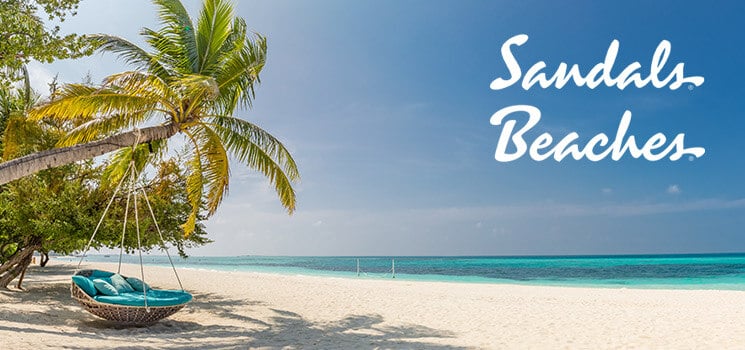
June 05, 2024
Discover the Allure of Sandals & Beaches Caribbean Resorts

May 14, 2024
20 Famous Filming Locations to Visit
Your dream vacation is just a few clicks away..

© Copyright 2024 InteleTravel.com. All rights reserved. Registered Seller of Travel Privacy Terms of Use Accessibility
Please Note: The translation of this website is accomplished through automated tools. It is necessarily imperfect, and we realize the technology makes some word choices which are incorrect. Please pardon us while we grow and improve in your market.
What’s the difference between a travel agent and a travel consultant?
Travel industry terms can sometimes be confusing, and two terms that are often used interchangeably are travel agent and travel consultant. While both individuals assist clients in planning and booking travel arrangements, there are some key differences between the two roles.
A travel agent typically works for a travel agency and is responsible for booking flights, hotels, car rentals, and other travel services on behalf of their clients. They act as intermediaries between travelers and travel suppliers, helping clients secure the best deals and packages. Travel agents have access to a wide range of resources and travel databases, which they use to find the most suitable options for their clients’ needs.
On the other hand, a travel consultant is a more specialized professional who goes beyond traditional booking services. They provide expert advice and personalized assistance to clients, offering a more tailored and bespoke travel experience. Travel consultants focus on understanding their clients’ preferences, interests, and budgets to create custom itineraries that perfectly match their needs. They often have extensive knowledge and firsthand experience of various destinations, allowing them to offer insider tips and recommendations.
FAQs about travel agents and travel consultants:
1. What qualifications are required to become a travel agent or travel consultant? To become a travel agent or travel consultant, there are no specific educational requirements. However, obtaining certifications from recognized travel organizations can enhance credibility and industry knowledge.
2. How do travel agents and travel consultants earn money? Both travel agents and travel consultants typically earn a commission from the travel suppliers they work with. Additionally, some may charge service fees for their expertise and time.
3. Can travel agents and travel consultants assist with visa applications? Yes, both professionals can provide guidance and support in the visa application process. They can help clients understand the required documentation and assist with filling out the necessary forms.
4. Do travel agents and travel consultants handle travel insurance? Many travel agents and travel consultants offer travel insurance as part of their services. They can help clients understand the different insurance options available and recommend the most suitable coverage for their travel plans.
5. How do travel agents and travel consultants stay updated on travel trends? To stay informed about the latest travel trends, travel agents and travel consultants regularly attend industry conferences, participate in training programs, and engage in networking activities. They also rely on travel publications and online resources to stay up to date.
6. Can travel agents and travel consultants book group trips? Yes, both professionals can assist with booking group trips. They have the expertise to handle the logistics of group travel, such as coordinating flights, accommodations, and activities for multiple individuals.
7. Are travel agents and travel consultants responsible for handling travel emergencies? Travel agents and travel consultants are often the first point of contact for clients facing travel emergencies. They provide support and assistance in rebooking flights, finding alternative accommodations, and navigating unforeseen circumstances.
8. Can travel agents and travel consultants assist with leisure and business travel? Yes, both professionals can assist with both leisure and business travel arrangements. They cater to clients’ specific needs, whether it’s a family vacation or a corporate trip.
9. How do travel agents and travel consultants handle cancellations or changes to travel plans? When clients need to cancel or change their travel plans, travel agents and travel consultants act as intermediaries between the clients and the travel suppliers to negotiate any possible refunds or modifications.
10. Do travel agents and travel consultants have access to exclusive deals and discounts? Yes, travel agents and travel consultants often have access to exclusive deals and discounts through their partnerships and relationships with travel suppliers. They can help clients find the best value for their money.
11. How far in advance should I consult a travel agent or travel consultant? It’s generally recommended to consult a travel agent or travel consultant as early as possible, especially for complex or customized trips. This allows them enough time to research and plan the perfect itinerary.
12. Can travel agents and travel consultants assist with destination weddings or honeymoon planning? Absolutely! Travel agents and travel consultants often specialize in planning destination weddings and honeymoons. They can handle all the intricate details, from coordinating travel arrangements for guests to finding the perfect romantic getaway.
About The Author
Garry Osborne
Leave a comment cancel reply.
Your email address will not be published. Required fields are marked *
Save my name, email, and website in this browser for the next time I comment.

Are you an Agent, a Consultant, a Professional or an Advisor?

Are you calling yourself the correct terms? Find out!
Written By: Tom Ogg, Co-Founder and Co-Owner – TravelProfessionalNEWS.com
The current effort to rebrand travel agents as travel advisors is taking an interesting turn in nomenclature. There are really numerous reasons why, but I will start with the most obvious.
Whether you call yourself an agent, consultant, professional, advisor or an MME (Memory Making Expert) as Patty Kollar CTA of PackNTravel does, it is really the client who determines what you are.
As Samarah Meil, of Amarillo Travel Network in Amarillo, Texas says “I honestly am great with being known as The Travel Agent to work with! I know it is trendy to use other names, such as Advisor, Consultant, Travel Junkie, Travel Ninja, Travel Designer, etc – but in the end, I really think most people just think of us as a Travel Agent and not in a negative way.”

Geoff Millar, Owner of Ultimate All-Inclusive Travel Inc shares “We still use travel agent for one main reason, our advertising. We did quite a bit of testing using travel consultant, travel advisor and a few other titles but we found that with all our advertising, Travel Agent still got the most response, almost 2 to 1 over the use of other titles. We also found that the quality of the responses or leads we received remained high quality.”
The Agency Law Factor
Using the term “Travel Agent” is an important part of Agency Law that dictates how travel agents present themselves to consumers. Agency Disclosure has a huge impact on your fiduciary obligation to the Principal in the transaction you are processing. If the client thinks that you are acting on their behalf solely and you fail to do your agency disclosure, you may well end up being held to a fiduciary standard for both the supplier and the client. This is indeed a tenuous position to be in.
There is an element of civil code known as Agency Law. The purpose of this information is to simply introduce the reader to laws that may affect their business as a travel agent and does not intend to offer legal advise. As in all legal matters the person to turn to for advise is your legal professional. The author of this chapter is not a legal professional.
So, let’s start by asking a simple question.
What is a Travel Agent?
The most common term for someone who sells travel is “Travel Agent”, but legally what does this mean? The term “Agent” means that you are acting on someone’s behalf, known as a “Principal”. A “Principal” that an agent represents may be a supplier, a client, or another third party. An “Agent” may represent a supplier, a client or another third party, two of the three, or all three at the same time.

What is Agency Law?
Here is a definition of “Agency” from Blacks Law Dictionary. ‘A relationship, created either by express or implied contract or by law, whereby one party (called the principal or constituent) delegates the transaction of some lawful business or the authority to do certain acts for him or in relation to his rights or property, with more or less discretionary power, to another person (called the agent, attorney, proxy, or delegate) who undertakes to manage the affair and render him an account thereof.’
Agency Law is the law regarding a Principal and an Agent. The law defines establishment and responsibilities of the principal and the agent. The law also defines element of “control” between principal and agent and it provides for the duties and termination of agency. Finally the Law defines legal responsibility of Principals and Agent.
What is a Fiduciary?
The most common is a trustee of a trust, but fiduciaries can include business advisers, attorneys, guardians, administrators of estates, real estate agents, bankers, stock brokers, title companies, or anyone who undertakes to assist someone who places complete confidence and trust in that person or company.

A fiduciary is held to a standard of conduct and trust far above that of a stranger or of a casual business person. It is the highest possible standard of care in business. A fiduciary must avoid “self-dealing” or “conflicts of interests” in which the potential benefit to the fiduciary is in conflict with what is best for the person who trusts him/her/it. For example, a stockbroker must consider the best investment for the client, and not buy or sell on the basis of what brings him/her the highest commission.
Whose agent is a Travel Agent?
Before the Airline Deregulation Act of 1981, travel agents were appointed by the Air Traffic Conference who executed an “Agency Sales Agreement” with travel agents that defined a travel agent’s duties and obligations to the ATC;s member carriers.
The Agreement imposed a fiduciary obligation upon the appointed travel agents. Today, the Airline Reporting Corporation (ARC) continues appointing travel agents and executing the “Agency Reporting Agreement” on behalf of its member airlines imposing a fiduciary responsibility upon its appointed travel agents.
Travel agents must adhere to the standards as set forth in Agreement and are held liable for any deviation of the standards. As an example, a travel agent that sells a client a “Hidden City Fare” to save the client money, will be charged the difference between the fare and the fare they should have sold. The agent breached their fiduciary obligation to the airline and will have to pay the debit memo.
Travel agents act as agents for the supplier who is the principal in the transaction.
What About the Client?
Remember that the definition of an agent is ‘A Relationship, Created Either by Express or Implied Contract“ Let’s say that the name of an agent’s agency is “Your Travel Agent” A new client visits the agency and asks “Are you MY Travel Agent?” The agent responds “Yes, I am YOUR travel agent?” In this case it would seem that the agent is implying that they are entering into an agent / principal relationship with the client. The client would have every reason to believer the agent has a fiduciary responsibility to them,
Here are the differences in the Relationship with the Client
As an agent of the supplier, you only have to be fair and honest with the client. You can’t cheat or grossly misrepresent information to the client. It is very difficult for a client to bring a lawsuit successfully when your agency relationship as an agent of the supplier has been disclosed.
As an agent for the client, you are held to a much higher standard of care for the client’s arrangements. If something goes wrong and you either knew or should have known about it, the client can sue using a claim of Breach of Fiduciary and be awarded substantial damages.

In an article entitled “Are You An Agent For A Supplier Or Fiduciary For The Client?” (Travel Market Report, July 7th, 2017) written by Paul Ruden, ASTA’s executive vice president for legal and industry affairs (now retired) shares details on how travel agents must disclose their agency relationship with the principle in a timely manner so that the client has an opportunity to cancel if they chose to do so. The disclosure should be done in writing and also continued in subsequent correspondence. The article is well worth the read to confirm your obligation as a travel agent.
It is crystal clear that referring to yourself as anything other than a travel agent may cause confusion for the client who might believe that a consultant is consulting on their behalf or that an advisor is advising on their behalf. A travel agent is acting on behalf of a Principle and using the term travel agent is on its face, agency disclosure.
Let’s look at the definition of the four terms being discussed as a business style. Here are the rawest forms of the meaning of each.
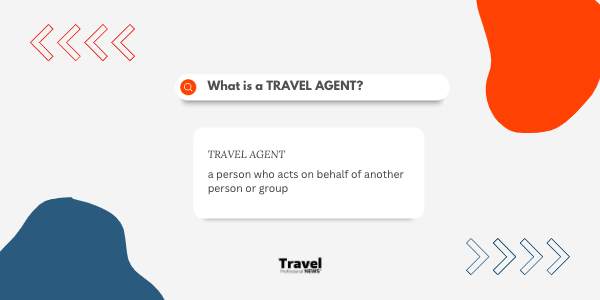
TRAVEL AGENT: a person who acts on behalf of another person or group.
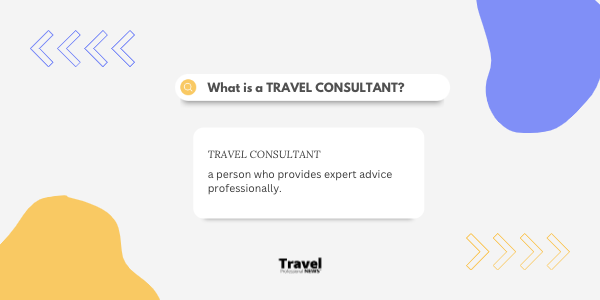
TRAVEL CONSULTANT: a person who provides expert advice professionally.
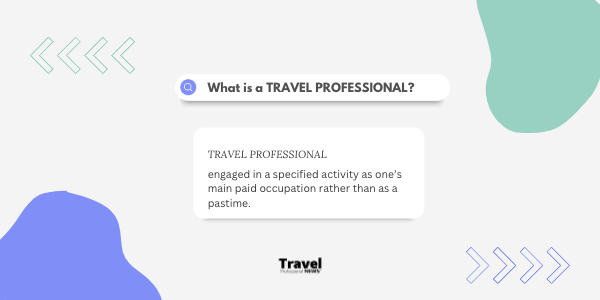
TRAVEL PROFESSIONAL: engaged in a specified activity as one’s main paid occupation rather than as a pastime.
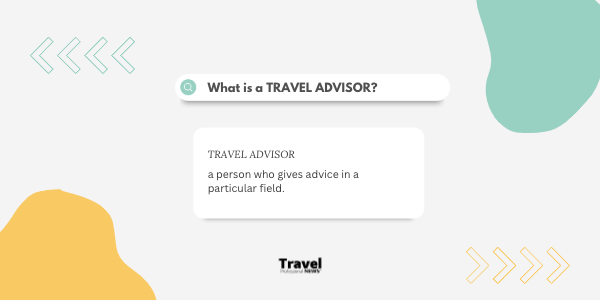
TRAVEL ADVISOR: a person who gives advice in a particular field.
You can see that all four seem applicable to travel agents. But wait, in an article entitled “ What’s in a Name? A Travel Agent by Any Other Name” (Travel Market Report, September 29th, 2017) Paul Ruden also shares that by calling yourself anything other than a travel agent you may be causing the consumer to think that you are their fiduciary and thereby cancel any legal protection afforded to you by doing your agency disclosure to the client.
The American Bar Association makes the obligation for agency disclosure to take place in order to avoid the pitfall of dual fiduciary quite clear in an article entitled “Travel Agents: Their Role and Liability” The article shares that most U.S. courts are now holding travel agents to a fiduciary standard, especially when leisure travel is involved and that the only way to avoid it is through agency disclosure. “However, as long as the customer is informed of the identity of the principal (e.g., the cruise line, tour company, hotel, etc.), the travel agent will not be held individually liable for a breach of contract by such disclosed principal. This legal concept of the disclosed agent of a disclosed principal is important for the travel agent to understand and explain to consumers so that the travel agent is able to avoid liability for breaches of duty or contract by travel suppliers.”
The Clumsy Truth About Disclosure
Let’s substitute “Travel Advisor” with another agent type and now consider “Real Estate Advisor.” The first assumption is that a real estate advisor doesn’t necessarily sell real estate (that is what a real estate agent does) but offers real estate advice, presumably for people considering either buying, selling or managing real estate. Since they are acting as an advisor, they must have a fiduciary relationship with you as the advisee. Here is what a disclosure statement from a real estate advisor might sound like.
“Yes, I am your real estate advisor. While I am actually a real estate agent working for my principle, as a fiduciary, which is the seller of the home you are interested in, I only have the obligation to be fair and honest to you as the buyer.”
You can easily see how clumsy this disclosure becomes. And, failure to disclose that they are acting as an agent for the Principle (the home owner) would easily put them in jeopardy of a breach of fiduciary claim should the house turn out to be faulty with no disclosure.
Kim DalPonte of Pixie Dust & Paradise Travel, Inc. shares “I have always called myself a Travel Consultant, but I say I own a Travel Agency (not a Travel Consulting Firm). However, no matter what I call myself, all of my clients, and the general population say, and relate to Travel Agent!”
“Yes we use travel counsellor on our business cards but I still say travel agent. It is just to get the point across that I do not just sell you a trip. I do not charge you a service fee and I will give you ideas on where to go, I will match up your interests with a resort to get a great fit. I will try to make it a seamless experience from the time you leave the house and are transported to the airport to when you come home and have after travel issues. So although I am a travel agent and will sell you a trip, we do so much more.” says Beth Lariviere with EA Travel and Tours in Ontario, Canada.
Mitch Krayton CTA of Krayton Travel in Aurora, Colorado asks “Do you sell your advice only? Then Travel Advisor is a good fit. Travel Professional says nothing about you and we all are professing travel. We get paid mostly by suppliers as their agents which is why Travel Agent works so well. We have no problem with insurance agent, real estate agent, do we? We sell for a living. Instead of hiding the obvious truth of what we do with a synonym no one understands. Be proud that you sell value to you travelers and that you have been chosen as an agent for travel by your suppliers.”
The Case For Being Called Something Other Than a Travel Agent
In an article entitled “This Is Why Travel Agents Want To Be Called Travel Advisors” (forbes.com 11/11/2018), Christopher Elliott, a reputable consumer advocate, tries to make the case for the change of nomenclature from travel agent to travel advisor. While his article is interesting, it lacks any understanding of the evolution of travel agents over the last three decades. He equates a travel agent as someone who is “just looking for a commission check” and that there is “a significant part of the travel agency community that wants to turn the clock back to 1990, to the days when they could earn a comfortable living with a phone call and a few keystrokes.”
The truth is that during the 1990s retail brick and mortar travel agencies were going bankrupt and closing in never-seen-before numbers. This was the result of the airline ticket commissions being first capped and eventually eliminated. I have been in the travel industry full time since 1968 and I can personally tell you that there was never a time when travel agents “earn a comfortable living with a phone call and a few keystrokes.”
Another truth is that while travel agents are agents of the Principle supplier, agents do everything conceivable to make the client’s travel experience as positive as possible. This includes full product disclosure whether it is a cruise, resort, tour, all-inclusive, or any other travel niche out there. They share their personal knowledge, expertise and experience with clients. They offer clients extensive support and services including matching the client with the perfect vacation choice, arranging detailed travel itineraries paving the way for a smooth journey and acting as the safety backup while the client is traveling.

In the “How To Tell If Your Agent is an Advisor” section of the article Mr. Elliott includes the following signs indicating you are working with an advisor: They Do More Than Book Travel: Travel agents have been doing this since their inception. In fact, today’s travel professional is going well beyond the “just booking travel” stage.
They Specialize: I am sure it is safe to say that pretty much all travel agents specialize in niches that allow them to develop expertise that is in demand with the traveling public. Never before has it been easier to reach niche oriented clients within a travel agent’s specific specialization.
They Offer Concierge Services: My long time friend Sandy Elson MCC , Owner of Your Cruise Concierge shares “I opened “Your Cruise Concierge” in 2004 as a cruise-only home based travel agency. Having been a travel agent since 1985, I knew that times had changed and I had to offer clients more than they could get on their own. With so much information available on the internet, I wanted to enhance my service as not only a “travel agent” but a “cruise concierge.” I offered services that were not available on the internet or from other travel agencies. including a menu of services, such as making dinner reservations in pre-cruise or post-cruise cities, or on the ships themselves. I researched and printed information about each port stop, including sightseeing suggestions and dining suggestions, which went far beyond the cruise lines’ information about the ports. The most important service I could offer was to keep myself informed and experienced about every cruise line, and every ship on that line, to better serve my clients. I became the “go-to” travel agent for my niche specialties, including family reunion cruises and luxury cruises. This knowledge and experience stands as the concierge feature of my service that my clients valued the most.”
They Charge a Consulting Fee: While many agents do charge a consulting fee, this hardly qualifies anyone as a travel agent, consultant, professional or advisor.
So Are You a Travel Agent, or What?
As Teri Hurley, Owner of Endless Love Travel in Georgetown, Texas says “Whether we like it or not, the public recognition remains attached to Travel Agent. I personally feel if you are doing your job correctly you are a consultant first, an advisor second and agent last, as you move through the client process to close your sale. However, strictly for marketing purposes, travel agent remains the go to tag.”

Vicki Scheck of ScheckTrek Travel in Pasadena, California shares “We all know that there is a movement underway to call ourselves almost anything other than travel “agents.” In order for the title to carry any weight, however, we would need to get behind that phrase “call ourselves.” I can call myself the Queen of Sheba, but does it mean anything? Anyone with a host agency can call her or himself a travel advisor and feel superior to the other poor soul who only calls her or himself a travel agent. And yet, the experienced travel agent might be in the Million-Dollar Club, and the new travel advisor might not have made her or his first booking yet.”
In the end, what you choose to call yourself is up to you. I kind of like the idea of calling yourself your specific niche “River Cruise Specialist”, “Hawaii Specialist” or “African Safari Specialist” which really helps clients identify what you do and who you are. The information in this chapter is not designed to substitute for the professional advice of an attorney. However, we have identified areas for consideration and discussion with your attorney and they are as follows:
- All Inclusive Resort
- Association and Events
- Host Agency
- Hotel and Resort
- River Cruising
- Tour Operator
- Sales and Marketing
- Your Travel Business
- Suppliers and Destinations
- Trade Associations and Events
- Free Downloads
- Your Travel Agency
- Destination
- Host Agency List
Add Travel Professional NEWS® to your Homescreen!

- The Benefits
- Custom Franchise
- Plans & Pricing
- Our Mission
- Testimonials

Providing you with the latest insights, information, tips and news about your favourite travel experiences and destinations.

- Video Blogs
- Image Slider
Travel Agents VS Travel Specialists: Which One Are You?

There are two types of agents in the travel industry. The ones who make a lot of money and win all the sales awards, and the ones that struggle to make a decent living selling travel. Agents that do extremely well are the agents that have learnt to become specialists, the ones that remain just a travel agent, are the ones that will continue to lose their customers to the Internet.
Are you a travel agent or a travel specialist? Let’s find out.
Travel Agent
You spend most of your marketing efforts promoting last minute travel deals, and cheap vacation packages. Due to this, you end up with a clientele that cares about price more than service. More times than not you waste time doing research only to lose the client because of price.
Travel Specialist
You never talk about price or promise customers any savings. You instead choose to focus on the intangible values your service brings to a customer. Your clients come to you because your bring expertise and a high level of service. More times than not, they do not question the price when you send them a quote.
You rely on your host agency for vendor relationships. You sell most of your travel through suppliers, consortiums and other middlemen. Without these establishments, you do not know how to find rates or put packages together. Because of this, your average commission stays below 15%.
You understand the value of forming relationships with vendors directly. Even though you work with suppliers and consortiums whenever they provide a better option for your clients, every opportunity you get, you work directly with vendors to establish your credibility and value. You understand that this is the key to unlocking the door to commission percentages of 20% or more.
You don’t specialize in anything. This means you try to sell everything. You promote deals, your promote weddings your promote discount hotels while still trying to find high-end clients. You are unsure how to market yourself because you don’t have an identity. People know that you are a travel agent but they cannot identify what type of travel you specialize in.
You only work with a handful of vendors and suppliers exclusively. You very rarely try to sell anything outside of your exclusive niche market. People that know you, know that you are the go to person when they want to book any of your specialty products. Your vendor partners know you and love you because you bring them a lot of business. You have so much clout with these vendors that you can call in special favors for your clients at anytime. You are invite to their various award ceremonies and you keep winning awards to add to your resume.
Travel Agent You do not think out of the box. Everything you sell are typical travel products that every other agent are selling and people can easily find online. You are afraid or unwilling to try anything new, or build a niche market of your own.
You have mastered the art of creating your own niche. You look for different interest groups and you use that to create new and unique reasons for people to travel. You are not just a travel specialist you are also a vendor because you have created your own products.
You May Also Like

6 Not Too Late 2017 Travel Agent Resolutions

10 Images That Explains Why The Caribbean Is The Perfect Vacation Destination

Sandals Resort Re-open newly Remodelled Sandals South Coast in Jamaica

7 Good Reasons To Start A Home-Based Travel Business
Leave A Reply
Popular categories.

Travel Agent Tips

Travel Agents

Travel News

Travellers Guide

Working From Home

Adult Travel

Nude Travel

Destination Weddings

Events and Festivals

Beyond The Boundaries

Family Travel

All-Inclusive Resorts
Get Expert Advice
Stay connected, latest quotes.

Sunset Destinations
Travel. It leaves you speechless, then turns you into a storyteller.
If we were meant to stay in one place, we'd have roots instead of feet he said.
Travel Brings The Power And Love Back To Your Life. - Rumi
The World is a Book, and those who do not Travel only read one page!
We travel not to escape life, but for life not to escape us. - Anonymous
- Privacy Policy
All Rights Reserved The Travelnet Inc.


Travel Planner vs. Travel Agent: What Are the Differences?
Learn about the two careers and review some of the similarities and differences between them.
Travel planners and travel agents are two professions that help people plan and book their travel arrangements. Though both roles share some similarities, there are several key differences between them. In this article, we discuss the differences between a travel planner and a travel agent, and we provide tips for choosing the right professional for your needs.
What is a Travel Planner?
Travel Planners are responsible for arranging all aspects of a client’s travel, from booking flights and hotels to planning itineraries and activities. They work closely with clients to understand their travel needs and preferences, then use that information to create a custom travel plan. Travel Planners must be knowledgeable about destinations, transportation options, accommodation options and activity options in order to provide the best possible experience for their clients. They also need to be able to find the best deals and discounts on travel services to save their clients money.
What is a Travel Agent?
Travel Agents work with individuals and groups to plan and book travel accommodations, transportation and activities. They use their knowledge of destinations, resorts, airlines and tour operators to find the best travel options and create custom itineraries. Travel Agents often have first-hand experience with the locations they recommend, which helps them provide more accurate advice and recommendations to their clients. They also keep up-to-date on the latest industry news and developments to ensure that their clients are getting the most up-to-date information. Travel Agents typically work in travel agencies, but some may work remotely.
Travel Planner vs. Travel Agent
Here are the main differences between a travel planner and a travel agent.
Travel planners typically focus on the travel planning aspect of their job, while travel agents handle a variety of tasks related to traveling. Travel planners help clients create personalized itineraries based on their needs and preferences. They research destinations, plan transportation and accommodation details and advise clients about local regulations.
Travel agents perform customer service duties by helping travelers with common issues like lost tickets or flight rescheduling. They also provide travel planning services by advising clients on destinations and accommodations. Additionally, travel agents may book flights and other modes of transportation for their clients.
Job Requirements
Travel planners and travel agents typically need at least a high school diploma to enter the field. However, many employers prefer candidates who have a bachelor’s degree in tourism or hospitality. Some travel professionals also pursue certification through organizations like the American Society of Travel Agents (ASTA) or the National Association of Career Travel Agents (NACTA). These certifications can help travel professionals stand out to potential employers and show that they are serious about their career.
Work Environment
Travel planners and travel agents work in different environments. Travel agents typically work in an office setting, where they can access information about their clients’ travel plans and book flights, hotels or other transportation options for them. They may also meet with clients in person to discuss their travel needs and preferences.
Travel planners often work in a variety of settings, depending on the type of trip they’re planning. For example, if they’re planning a cruise, they might work from home or at a desk in an office building. If they’re planning a hiking trip, they might go to the location of the hike to scout out trails and plan activities for the group.
Travel planners and travel agents share some skills, such as customer service, communication and organizational skills. They both need to be able to understand the needs of their clients and provide them with options that meet those needs. Travel planners and travel agents also need to be able to keep track of many details at once and stay organized while they are making travel arrangements for their clients.
However, there are some differences in the skills needed for these jobs. Travel planners may need more research skills than travel agents as they often work with clients who are planning trips to destinations that they are not familiar with. Travel planners also need to be able to use computer software to book travel arrangements and create itineraries. Travel agents typically have access to booking systems that make it easier for them to find and book travel arrangements for their clients.
Travel planners can earn an average salary of $58,112 per year, while travel agents can earn an average salary of $44,694 per year. Both of these average salaries may vary depending on the size of the company at which you work, location of your job and the level of experience you have prior to pursuing either position.
Chemist vs. Biologist: What Are the Differences?
Group leader vs. team leader: what are the differences, you may also be interested in..., staff engineer vs. project engineer: what are the differences, site supervisor vs. site manager: what are the differences, administrative professional vs. administrative assistant: what are the differences, draftsman vs. engineer: what are the differences.
It's Official, Our Leads Program and Booking Portal With Over 750,000 Hotels Has Launched For Our Agents. Learn More
Travel Agent Resources
Travel agent vs. travel advisor: understanding the distinction.
- X (Twitter)
By Courtney Eisen
March 15, 2023
When planning a luxury vacation, it is important to understand who you should turn to for expert advice - is it a travel agent or an advisor? There has been much debate about the difference between the two professions, with some claiming that they are interchangeable while others insist that they do not. The truth of the matter is that while the terms "travel agent" and "travel advisor" may be used differently in popular culture, they refer to the same type of professional in reality.
When pursuing a career in selling travel, you may find yourself torn between two titles - travel agent or travel advisor. There has been an ongoing debate about the differences between these two professions. While some argue they are interchangeable, others insist they carry distinct meanings. In reality, however, both terms refer to the same type of professional.
Luxury Travel Agents and Advisors: Similar Services, Extensive Knowledge
Luxury travel agents and luxury travel advisors share extensive industry knowledge and offer similar services to their clients. Whether you choose to be an agent or an advisor, you will have access to exclusive deals on high-end resorts, cruises, and flights. These professionals excel at organizing luxury trips and often have valuable contacts within the industry. These connections allow them to secure discounted prices or special services that may not be readily available through mainstream channels. They can negotiate prices, book reservations, provide destination advice, and suggest attractions or activities based on your preferences.
The Subtle Connotation: Tailored Experiences
The main distinction between the two titles lies in a subtle connotation. The term "travel advisor" emphasizes the creation of unique experiences tailored to each client's specific needs. Advisors take into consideration factors such as budget, destination preferences, accommodations, activities, food and beverage options, and more. Those who prefer to be called travel advisors instead of travel agents aim to communicate a more sophisticated approach to travel. They want to differentiate themselves from run-of-the-mill travel agents by highlighting their ability to curate personalized experiences. While the term emphasizes this aspect of service, it doesn't exclude the same services from being associated with the title "Travel Agent".
Interchangeable Usage: Focus on Training and Certification
In popular culture, the terms "travel agent" and "travel advisor" are often used interchangeably. It's important not to get too caught up in the difference between the two. Both professions require formal training and up-to-date certification from accredited institutions like IATA to operate lawfully. Whether you choose to go by the title of agent or advisor, know that the path to success in this industry remains the same.
If you're interested in pursuing a career as a Luxury Travel Advisor or Agent, LuxRally Travel is here to support you. We offer free, online, self-directed travel agent training along with a range of resources designed to ensure your success. As a Luxury Host Agency founded by the highest-grossing luxury travel agent in the world, LuxRally Travel understands what it takes to turn travel into a six or even seven-figure career.
Why does LuxRally Travel use the title Luxury Travel Agent?
The answer is simple; people use the word travel agent more than travel advisors when searching for our services on Google. We want people looking for luxury travel agents to find us, and the search volume supports this decision. Additionally, while there is a more luxurious connotation to the term travel advisor, we do not see a material difference and find that only industry professionals care about the differences between the terms. Instead of using a different word, we aim to redefine what people think about when they hear the word "travel agent." We use our services and commitment to excellence to differentiate ourselves, not semantics.
Now, let's address some common questions that people researching how to become a travel agent or travel advisor often ask:
Do I need formal training to become a travel agent or travel advisor?
Yes, both professions require formal training and up-to-date certification from accredited institutions such as IATA. This ensures that you have the necessary knowledge and skills to operate lawfully and provide quality service to your clients.
What sets a luxury travel advisor apart from a regular travel agent?
Nothing separates these terms but the semantics and the connotation.
How can LuxRally Travel help me succeed as a luxury travel advisor or agent?
LuxRally Travel offers free, online, self-directed travel agent training to equip you with the knowledge and skills needed for success. As a Luxury Host Agency founded by the highest-grossing luxury travel agent in the world, we understand the industry inside out and provide additional resources to help you build a thriving career.
Remember, whether you choose to be called a travel agent or a travel advisor, what matters most is your dedication to providing exceptional service and creating unforgettable experiences for your clients.
If you are interested in becoming a Luxury Travel Advisor (or Agent) LuxRally Travel offers free, online, self-directed travel agent training along with a host of other resources to ensure success. As a Luxury Host Agency founded by the highest-grossing luxury travel agent in the world , LuxRally Travel understands what it takes to turn travel into a six or even seven-figure career.
More Resources

Why You Should Be a 24 Hour Travel Agent

How Do Travel Agents Make Money?

How to Start a Travel Agency From Home
- Tour Operators
- Destinations
- Hotels & Resorts
- Agent Feedback
- Deals & Incentives
- On Location
- Industry Experts
- Sphere – HomeBased
- Digital Editions
- Subscribe today!
- Hotels and Resorts
- Types of Travel
- Subscribe Now
“Travel Agent” or “Travel Advisor”: Which is correct?
Post date: Dec 8 2022
Date: Dec 8 2022
By: Cindy Sosroutomo
TORONTO — So you’re finally ready to book that bucket-list trip you’ve spent years saving up for. Who do you turn to for help: a travel agent or a travel advisor?
Turns out, they are one and the same, at least from a consumer’s perspective. But ask an actual travel professional and they’ll tell you the two terms couldn’t be more different.
The divergence in terminology came to a head in 2018 when the American Society of Travel Advisors (ASTA) launched a rebrand that replaced the term ‘travel agent’ with ‘travel advisor,’ based on the fact that their role and responsibilities are no longer simply transactional.
Following ASTA’s rebrand, ACTA (Association of Canadian Travel Agencies) here in Canada researched the terminology in late 2019 and found that although ‘travel agent’ was more commonly used at that time, ‘travel advisor’ was becoming increasingly popular.
“At that time, some travel agency owners and travel agents preferred to use the terminology of travel agent because A) They liked the term, and B) They preferred to make it clear that travel agents are ‘agents’ of a travel supplier from a legal perspective,” says Wendy Paradis, President of ACTA.
“With the emergence of the pandemic in early 2020, and government advocacy for financial support, ACTA intentionally continued to use the terminology ‘travel agent’ since this was the terminology government was most familiar with,” she adds.
However, in 2022, Paradis notes that most organizations associated with the United States, “for example, consortia and travel suppliers,” are now using the term ‘travel advisor,’ along with many Canadian travel agents. She adds that other popular terms in Canada include ‘travel consultant,’ ‘travel counsellor’ and ‘travel specialist.’
When asked whether the terminology actually makes a difference in the way consumers view travel agents, Paradis says that over time, it will.
“Evolving to the terminology ‘advisor’ seems to be becoming common in other industries as well, such as Financial Advisor, Insurance Advisor and Real Estate Advisor. But I do notice that many organizations in these industries continue to use both, like Insurance Agent and Real Estate Agent,” she adds.
With both terms being used simultaneously, Travelweek took the question directly to travel professionals hemselves: how do they prefer to be known – travel agent, or travel advisor?
Laurie Keith, President of Boutique Travel Services, says that the majority of her American travel agent friends refer to themselves as ‘travel advisors,’ however, she still refers to herself as a ‘professional travel agent.’
“This is what I’ve been for over 25 years and this is what Canadian consumers understand best. I’ve heard of other titles like ‘dream-maker,’ ‘travel consultant’ and ‘travel concierge,’ but I think they all still point back to our core business – being a travel agent.”
Keith notes that although today’s travel agent offers professional and expert advice, “we still act as an agent, securing travel arrangements for our clients through third party travel suppliers, much the same way since the first travel agency started in 1865 under Thomas Cook.”
Lise Archambault, Travel Agent & Cruise Centre – TravelPlus in Ottawa, ON, also agrees, telling Travelweek that the way she prefers to be recognized is the same way she’s listed below her signature – Travel Agent.
“I am a TICO-certified agent, which means I have licence to book travel, not just give advice or guidance, something already clearly in my repertoire,” says Archambault. “Let’s say you were moving to Ottawa. I could give you advice and guide you to a great neighbourhood, but I can’t sell you a house. That’s the distinction for me. As an agent, I have the credentials to close the deal.”
Though both Archambault and Keith make valid points, the vast majority of travel professionals Travelweek reached out to prefer to be called ‘travel advisor.’ Here’s what they had to say:
Heidi Hurst, Lead Travel Agent and Adventure Travel Specialist, Hideaway Travel, Calgary, AB
“I don’t mind the difference between travel agent and travel advisor. With the idea of ‘travel advisor,’ it maybe places more emphasis on what it is that we do, because we do give a lot of advice. And with ‘travel agent,’ it seems to be more about just taking a booking. But I don’t like when people use the term ‘travel advisor’ to justify their fees. “it’s not posh, it’s not grandiose. It doesn’t change anything, but I think sometimes it changes the way people think about you.”
Scott Penney, Travel Advisor, The Travel Agent Next Door, Stewiacke, NS
“I prefer travel advisor. The main difference between the two is the level of service you provide to your client. As travel advisors, we are not order takers, and even though our clients are much more educated, they have more questions, need more advice and more recommendations than ever before since so much has changed over the last couple of years. Our roles are so much more now than just pushing a button, and files are way more complicated than in the past.”
Joanne Saab, Travel Advisor, Curated Travel, Ancaster, ON
“I prefer travel advisor or, given my business name, I often refer to myself as a Travel Curator as really this is what I’m doing for my clients – curating unique itineraries and trips. But I definitely prefer travel advisor over travel agent. ‘Travel agent’ infers a simple transactional process. You are an agent or a seller of a specific travel product – full stop. ‘Travel advisor’ is a more inclusive term for the services we provide. It also infers there is some sort of relationship that exists between the travel advisor and the client, which is true.”
Brenda Slater, Beyond the Beach, Tiny, ON
“I prefer to go by travel advisor – or independent travel advisor – although my business card says ‘travel concierge’ because that is how I prefer to work with clients. The difference is, a travel agent is someone who is more of an order taker, usually new, usually sticks to selling all-inclusives and pre-packaged tours. A travel advisor is capable of more. They have usually done extensive training and research and are capable of assisting with independent travel.”
Cindy Gaudet, COO, Fareconnect.com
“Over the last few years, we feel our title has definitely become more as a ‘travel advisor.’ There is a lot more advice and preparation involved now in sending clients on their travels. Travel advisors play a very important role in the development and growth in the tourism industry now. We have educated ourselves on a whole new level.”
Marilyn Stainer, Cruise and Travel Consultant, Burnaby, BC
“I would definitely prefer travel advisor. To me a travel agent is an order taker and only books exactly what is requested and nothing more. A travel advisor does just that – advises. Before booking or making any suggestions, we ask many questions to see what the best fit would be for the client and may suggest upgrades that the client may not even know is available. We have done a lot of travelling so we have firsthand knowledge of a resort, cruise or tour package to make suggestions for our clients that they will enjoy.”
Gary Rams, Soft Adventure Specialist, Independent – Crowfoot Travel Solutions, Calgary, AB
“When clients think of me I try to have them think of the term ‘Soft Adventure Specialist.’ For some clients, I would like them to refer to me as a travel advisor. How clients see us is very important. The term ‘travel agent’ reminds me of where we were years ago – an agent for airlines and tour operators. The term ‘travel advisor’ is more in line of working for clients. We advise the best value and experiences.”
Tony Santelli, Senior Travel Advisor, FunRexAlcyon Travel, Laval, QC
“Definitely travel advisor. In fact, I usually add ‘Senior Travel Advisor’ after my name. The reader will either think I’m old or that I have many years of experience in the travel industry. They would be right on both counts. The term ‘agent’ today sounds archaic. It was used when one was a ticket agent such as an airline ticket, rail ticket agent and passenger ship ticket agent. One need only see the work performed by travel advisors during the pandemic and we can all be proud of having been ‘advisors’ to our clients.”
Marianne Vogel, Just for You Travel & Consulting, Dundas, ON
“I like to be referred to as a travel advisor because that means long term. I want to serve my clients long term, not just a one-time deal. A travel agent means an order taker in my book, and you are only working for the supplier, whereas an advisor works for the clients and the suppliers who are offering their properties. I care about my clients’ trips, interview them to find out their likes and dislikes, and try to advise them on the best places to go that reflects their wants and needs.”
Carol Murray, President, Your Vacation Home, Concord, ON
“I definitely prefer travel advisor over travel agent. I would even add a ‘professional’ in front to make it ‘Professional Travel Advisor.’ The term ‘agent’ may incorrectly imply that you are simply a ‘booker’ of travel, like someone at a help-desk. Advisors, on the other hand, are there through the whole process, including when the client is in destination and upon their return.”
Valerie Murphy, Travel Advisor, Vision Travel, Waterloo, ON
“I might be a little old school as I am used to being called a travel agent, but I think ‘advisor’ does describe what we do, rather than ‘agent.’ An ‘agent’ makes me think of a ticketing agent just running off tickets, when in reality we are advising clients on all aspects of their travel – documentation requirements, health requirements, giving options on hotels, resorts, locations and more.”
Got a story idea? Reach out to Deputy Editor Cindy Sosroutomo at [email protected] .

Tags: Advisor, Agent, Lead Story
Cindy is Deputy Editor at Travelweek and has worked for the company since 2007. She has travelled to more than 50 countries and counts Kenya, Morocco, Thailand and Turkey among her favourite destinations.

IMAGES
COMMENTS
What is the difference between a travel agent and a travel consultant? The shift started in the 1990's with the introduction of online booking sites. Travelers who once reserved air tickets and hotels directly with a travel agent now had access to book directly.
Consultants rely on personal knowledge and destination experience. • Agents can access a profile of their clients. Consultants have personal knowledge of their clients' likes, dislikes, travel ...
The differences between travel agents and travel consultants can be seen in a few details. Each job has different responsibilities and duties. It typically takes 1-2 years to become both a travel agent and a travel consultant. Additionally, a travel consultant has an average salary of $46,705, which is higher than the $33,128 average annual ...
Geoff Millar, Owner of Ultimate All-Inclusive Travel Inc shares "We still use travel agent for one main reason, our advertising. We did quite a bit of testing using travel consultant, travel advisor and a few other titles but we found that with all our advertising, Travel Agent still got the most response, almost 2 to 1 over the use of other titles.
Travel consultant jobs: are they any different from travel advisor or travel agent jobs? Is there a difference between travel advisors and agents? We get it — it's confusing. That's why we're covering all the bases, from traditional in-office travel agent positions to contemporary remote travel consultant jobs.
Travel consultant vs travel agent. Both require strong organizational skills, knowledge of destinations and handling logistics such as flights, accommodation and activities, but these professions differ in some ways. Below, we'll discuss the main similarities and differences between a travel consultant and a travel agent. Similarities.
Travel consultant vs. travel agent The main difference between travel consultants and agents is that travel consultants plan trips, while travel agents book them. Travel agents may be better skilled at locating the best prices for flights and hotels. Alternatively, travel consultants specialize in finding the best destinations based on a client ...
How much you pay for a travel professional's services depends on the work you hired them for. If it's for a few bookings, you may get a $50-$75 bill, on average. However, if you're hiring an advisor to help you design a full travel itinerary, with bookings included, you can expect a fee as high as $500 or even more.
Travel Consultant. A travel consultant is an independent professional who works with clients to plan custom trips or vacations. Unlike a travel agent who works within the constraints of their employers' policies and packages, a travel consultant has the freedom to design individualized itineraries based on the client's interests and needs.
What is the difference between a travel consultant and a travel agent? Do travel consultants offer more expertise than travel agents? ... Unlike a travel agent, a travel consultant takes the time to listen to customers, identify their preferences, and tailor travel itineraries accordingly. Discover how this personalized approach enhances the ...
What is the difference between a travel agent and a travel advisor? Virtually nothing. ASTA stands for the American Society of Travel Agents. Well, of Travel Advisors, now. Founded in 1931, they're a trade association that was formed to represent and defend the business and regulatory public policy interests of travel intermediaries ...
Two common titles that often come up are "travel agent" and "travel consultant." While these terms are often used interchangeably, there are some notable differences between the two. A travel agent is someone who helps individuals or groups book travel arrangements, such as flights, hotels, car rentals, and tours.
The divide between the travel agent who follows orders and the travel consultant who develops experiences could not be wider. More than 64,000 travel agents were active in the U.S. in 2014 ...
The upside of working with a travel agent is having someone plan an epic vacation for you based on industry knowledge and local expertise. But this can also be a downside in the event you discover ...
Other Benefits of Using a Travel Advisor. · Travel advisors work directly with a hotel's executive team (whom they often have a personal relationship with!) to personalize your stay. Consumers are all about authentic experiences and extras these days. A travel advisor takes your experience even further by handling your show tickets and ...
A travel agent works with you to find and book the perfect trip. They help with planning trips and the best travel advisors provide you with insight and firsthand experience to book the perfect trip based on your personal style. Not dissimilar from a real estate agent when you buy a house, a travel agent is essentially someone who can guide you ...
Since the mid-20th century, travel agents have mainly served as booking agents for airlines and hotels. Think back to family trips of your youth: There's a decent chance a travel agent was involved at some point, especially if you were embarking on a cruise or to an international destination. Your travel agent likely handled flights ...
How do travel agents and travel consultants earn money? Both travel agents and travel consultants typically earn a commission from the travel suppliers they work with. Additionally, some may charge service fees for their expertise and time. 3. Can travel agents and travel consultants assist with visa applications? Yes, both professionals can ...
Travel agents must adhere to the standards as set forth in Agreement and are held liable for any deviation of the standards. As an example, a travel agent that sells a client a "Hidden City Fare" to save the client money, will be charged the difference between the fare and the fare they should have sold.
There are two types of agents in the travel industry. The ones who make a lot of money and win all the sales awards, and the ones that struggle to make a decent living selling travel. Agents that do extremely well are the agents that have learnt to become specialists, the ones that remain just a travel agent, are the ones that will continue to lose their customers to the Internet.
Travel Agents typically work in travel agencies, but some may work remotely. Travel Planner vs. Travel Agent. Here are the main differences between a travel planner and a travel agent. Job Duties. Travel planners typically focus on the travel planning aspect of their job, while travel agents handle a variety of tasks related to traveling.
The main distinction between the two titles lies in a subtle connotation. The term "travel advisor" emphasizes the creation of unique experiences tailored to each client's specific needs. Advisors take into consideration factors such as budget, destination preferences, accommodations, activities, food and beverage options, and more.
The difference is, a travel agent is someone who is more of an order taker, usually new, usually sticks to selling all-inclusives and pre-packaged tours. A travel advisor is capable of more. They ...